Living Synodal Leadership: Responding to the Call of the Holy Spirit
A report from the 2022 Catholic Partnership Summit


A report from the 2022 Catholic Partnership Summit


In partnership with lay, ordained, and religious leaders and organizations across all sectors of the Catholic community in the United States and Rome, Leadership Roundtable seeks to elevate and implement best practices in management and leadership to establish a culture of co-responsible, servant leadership for a healthy, thriving Church in the U.S.
 (Left to Right) Elizabeth McCaul, Carol del Silva, Mar Muñoz-Visoso, Jamie Maloney
(Left to Right) Elizabeth McCaul, Carol del Silva, Mar Muñoz-Visoso, Jamie Maloney
Session 3: Members, Not Guests p.36
Session 4: Emerging Models of Leadership in Practice
p.46
Leadership Roundtable’s Next Steps
p.55
J. Donald Monan, SJ Distinguished Catholic Philanthropy Medal

p.62
List of Expert Contributors
p.66
Board and Staff
p.67
Summit 2024 Save the Date
p.68 Sponsors inside back cover

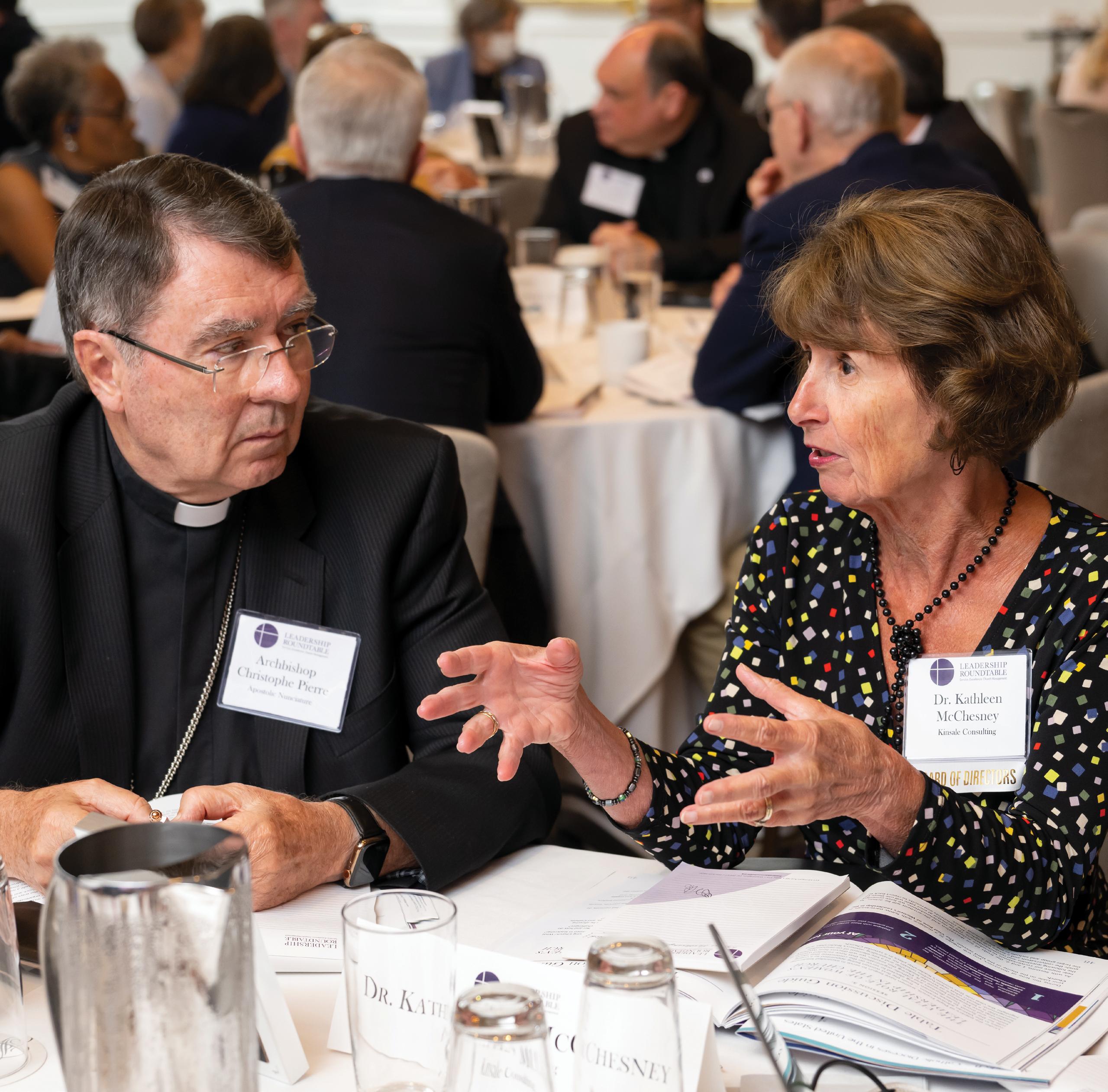

We are thrilled to present to you our report on the discussions and recommendations developed during the 2022 Catholic Partnership Summit. The Catholic Partnership Summit brings together Catholic leaders to address the most pressing challenges and opportunities facing the Church.
Throughout 2022, the Catholic Church was engaged in the global Synod process, a consultation with the entire body of Christ as we work collectively to “rediscover the Church’s deeply synodal nature.” In the United States alone, more than 700,000 people took part in the Synod.
We were excited to be back together in person this year for the Summit to discuss “Living Synodal Leadership: Our Call to a Unified Church” and discern recommendations to help our Church respond to this call.
Through the work of the Holy Spirit, our 2022 Summit took place mere days after the United States Conference of Catholic Bishops issued their synthesis report on the synodal consultations in the U.S. The 2022 Summit uniquely offered the more than 230 Catholic leaders gathered in Washington, D.C. the first chance to discuss the emerging results of the Synod and discern how the Church moves forward.
We were honored to facilitate critical conversations surrounding unity in our Church, welcoming and including those historically excluded, the vital role of women’s leadership and the need to further expand it, as well as hear from leaders using emerging models of leadership and innovation to help build a healthy, thriving Church.
Finally, we were overjoyed to be joined virtually by Secretary General of the Synod, Cardinal Mario Grech, who offered an inspiring address via livestream from Frascati, Italy. He graciously stepped away from his work with Synod leaders synthesizing the reports from bishop’s conferences across the world to offer both an update on the Synod and his encouragement to those gathered.
In this report, you will find summaries of each panel and the keynote address by Cardinal Grech, as well as recommendations raised by the leaders gathered to help our Church and its leaders live synodal leadership.
We hope you enjoy this report!
Sincerely,
Elizabeth McCaul, Chair of the Board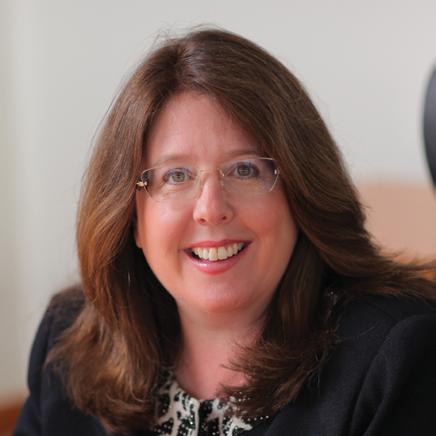


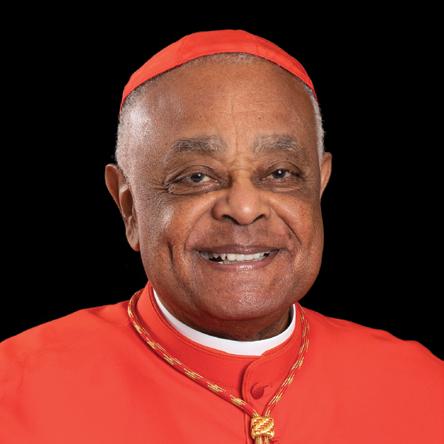
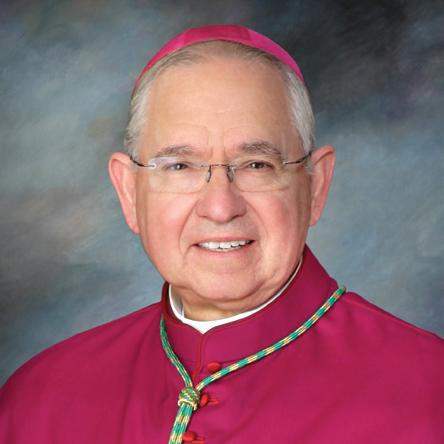



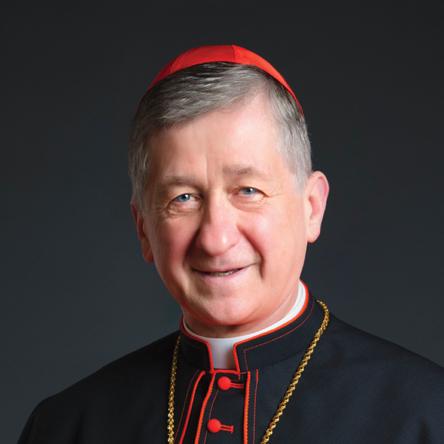





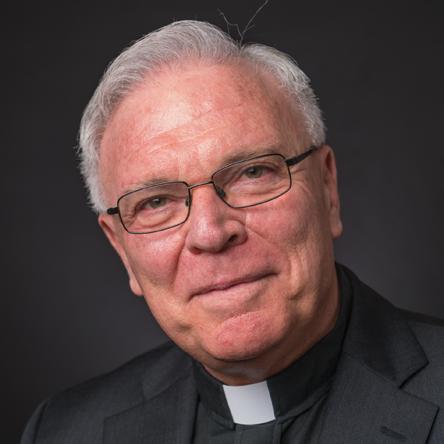
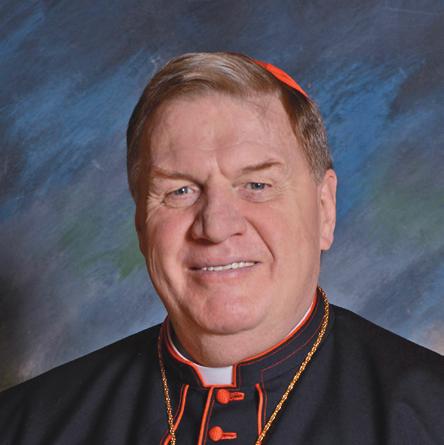






 Rev. Dennis Holtschneider, CM
Cardinal Blase Cupich
Cardinal Daniel DiNardo
Archbishop Christophe Pierre Archbishop José Gomez
Cardinal Wilton D. Gregory
Cardinal Seán O’Malley, OFM Cap.
Cardinal Joseph A. Tobin, CSsR
Rev. Dennis Holtschneider, CM
Cardinal Blase Cupich
Cardinal Daniel DiNardo
Archbishop Christophe Pierre Archbishop José Gomez
Cardinal Wilton D. Gregory
Cardinal Seán O’Malley, OFM Cap.
Cardinal Joseph A. Tobin, CSsR



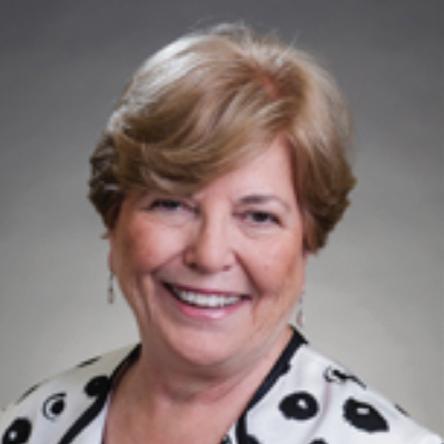
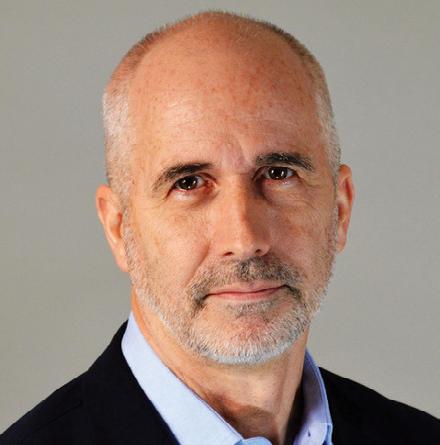

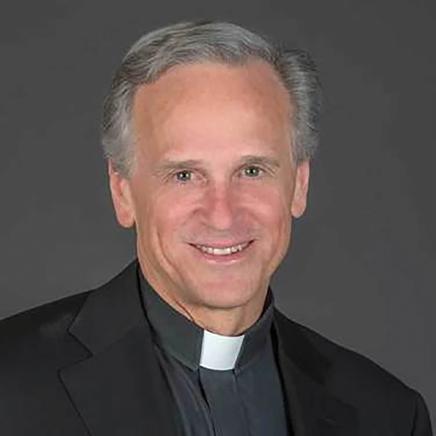



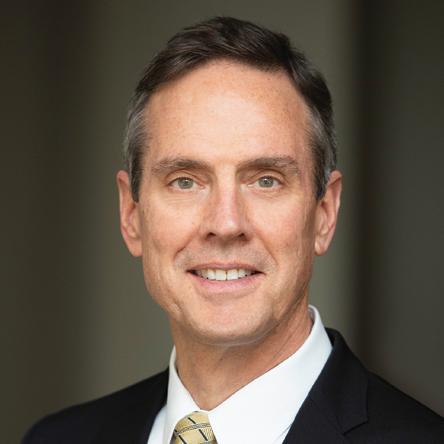



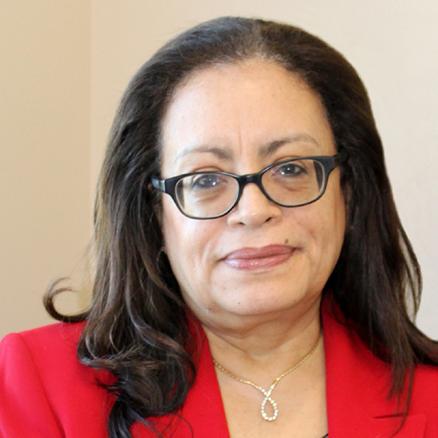



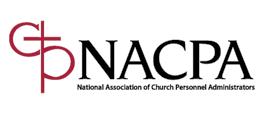


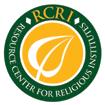
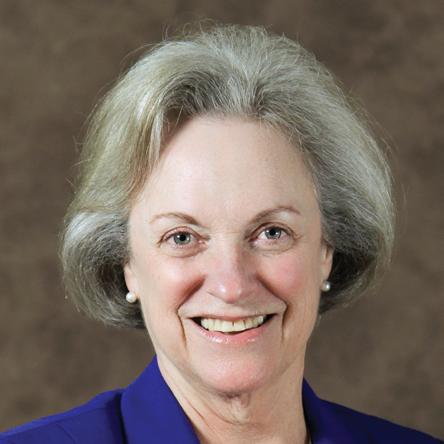



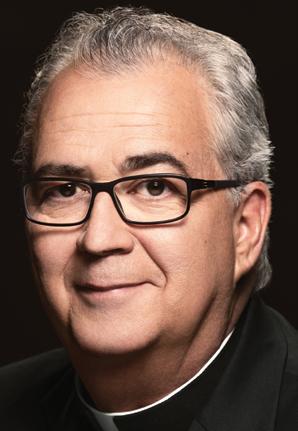

 David Gibson
Rev. Peter M. Donohue, OSA
Rev. Brian Shanley
Sr. Sharon Euart, RSM
Sr. Mary Haddad, RSM
Regina Haney Alexia Kelley
Rosie Shawver Lincoln Snyder
Elisabeth Román
Sr. Carol Zinn, SSJ
Sean Callahan
Rev. Frank Donio, SAC
David Gibson
Rev. Peter M. Donohue, OSA
Rev. Brian Shanley
Sr. Sharon Euart, RSM
Sr. Mary Haddad, RSM
Regina Haney Alexia Kelley
Rosie Shawver Lincoln Snyder
Elisabeth Román
Sr. Carol Zinn, SSJ
Sean Callahan
Rev. Frank Donio, SAC
The 2022 Catholic Partnership Summit sought to build upon the global work of the 2021-2023 Synod, as well as our 2020 and 2021 Catholic Partnership Summits. During our time together we followed the guiding principles for establishing recommendations set forth below.
All recommendations put forth during the 2022 Catholic Partnership Summit would:
1 3 5
2 4 6
Impact the Catholic Church based on three principles: accountability, transparency, and co-responsibility
Impact the leadership and management culture of the Church, in line with Catholic beliefs, ecclesiology, and canon law
Restore trust in the Church based on measurable, visible outcomes
Engage lay, religious, and clergy members of the Catholic faith working together for the mission of the Church
Lean forward into new possibilities
Be realistic and able to be translated into practical strategy and implementation.
• Leaders need to create and sustain a synodal Church culture, as it is the future of the Church.
• There is a need for ongoing communication, information-sharing, and transparency so the ideals and purpose of synodality are understood and the outcomes are realized.
• Accountability is a key element in building synodal Church culture and restoring trust with the People of God.
• The Church is being called to listen to and actively seek to include those who have been historically marginalized. It is vital for the Church to strive to include all members of the body of Christ in Church life.
• The Church needs to become a model for, and a teacher of, how to live in unity among the great diversity and polarization of our world with a particular focus on charitable dialogue and conflict resiliency.
• For positive transformation to occur, leaders must do the hard work of changing the ways they lead in the Church by finding the energy to learn new things and change patterns.
• The Church needs to create and implement human resources policies that better reflect the role of women in our Church and society.
• Among the People of God there is a strong desire for women to serve in greater leadership capacities within the Church, but there are still structural and cultural barriers to women stepping into those roles.
• A co-responsible Church culture requires transparency regarding how many women serve in Church leadership and the roles that are open to them, as well as increasing the presence of women in leadership roles within seminaries and early formation of clergy.
• Women face unique challenges as leaders in the Church and deserve support, community, and means of connection as they take on greater leadership roles.
• Certain leadership structures should be reevaluated and some changed if the Church is to heal, strengthen, and thrive . The Church must adapt to become more transparent and responsive, while still meeting the needs of those the Church serves.
• Young adults, Hispanics/Latinos, and other people of color deserve a seat at the leadership table. The Synodal process has presented the opportunity for the Church to invest in and actively include these communities more going forward.
• Innovation is a key part of the Synodal process as the Church considers the input of the People of God and how it will move forward. Encouraging and supporting innovation is part of how the Church will remain relevant and agile in carrying out its mission.
• The body of Christ is made up of humans and it is important for the institutions of the Church to not lose sight of the inherent dignity of the people involved in and impacted by its decisions and structures.
Throughout the Summit there was a recognition that:
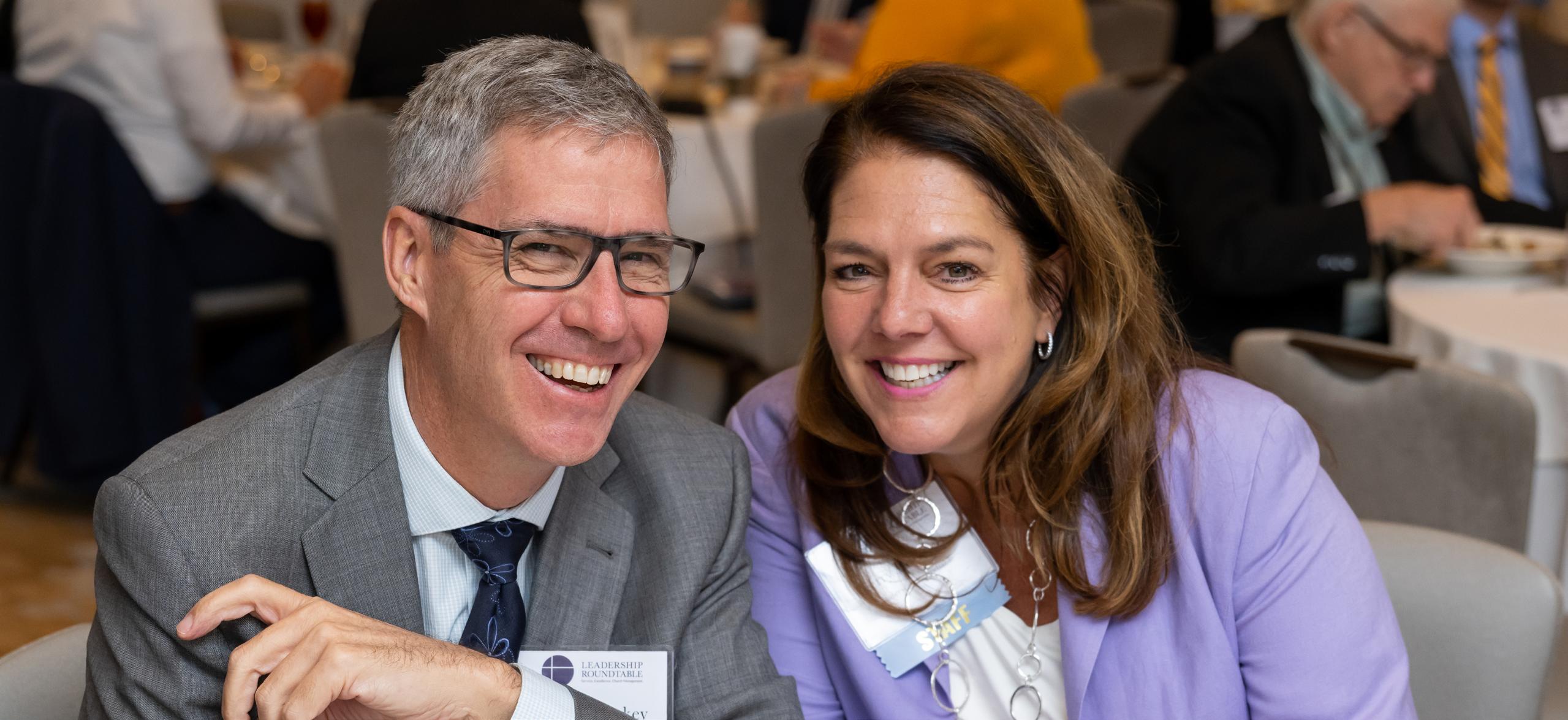
The 2022 Catholic Partnership Summit offered more than 230 leaders from 53 dioceses across the United States, Rome, and Europe the unique opportunity to collectively discern how we respond to the call to Live Synodal Leadership mere days after the United States Conference of Catholic Bishops released the results of the Synod in the United States.
The Summit, planned before most dioceses held consultations with the People of God, sought to facilitate discussions among Catholic leaders of how we live synodal leadership as we work to become a synodal Church. The Summit asked attendees to focus on four vital issues relevant to living synodal leadership — Our Synodal Roadmap, Being One Church, The Vital Role of Women’s Leadership in the Church, and Emerging
Models of Leadership in Practice. As evidenced by the results of the Synod in the U.S., the Holy Spirit had these same issues on the hearts of the People of God.
Pope Francis has emphasized that “synodality is an ecclesial journey that has a soul that is the Holy Spirit.” Throughout the 2022 Catholic Partnership Summit we consciously offered space and welcomed the Spirit to guide the discussions and the work to formulate actionable recommendations for living synodal leadership at all levels of the Church.
This executive summary contains major themes that emerged from Summit speakers and small group discussions.
Pope Francis has called upon the Church to become synodal — listening to the Holy Spirit, engaging all members of the body of Christ, especially those historically marginalized, in dialogue and discernment. Through promoting and understanding the results of the Synod on Synodality, working to build synodal structures into the operations of the Church, investing in the formation of leaders in synodal leadership, and continuing to regularly consult with the People of God, we respond to this call and build a truly synodal Church.
Accountability is a key element in building synodal Church culture and restoring trust with the People of God. Ensuring that each parish and diocese has active, functioning boards, councils and committees, as well as cultivating and supporting leaders within each faith community, our Church can build accountability and ownership at every level.
As the Church strives to become more synodal, there is a need for ongoing communication, informationsharing, and transparency so the ideals and purpose of synodality are understood and the outcomes are realized. From developing and sharing resources for
formation in synodal leadership and the principles of synodality to creating communications that clearly and easily help people understand synodality, the Church must actively work to ensure synodality is part of leadership culture.

Synodality requires leaders to seek out and engage with a diverse mix of individuals, particularly those historically excluded, those on the margins, and those who have left the Church. However, the Church must also welcome those on the margins to active life in the Church. This includes prioritizing having a diversity of experience and thought represented in all leadership and decision-making bodies, and actively engaging those who have been historically excluded.
It is vital for the Church to strive to include all members of the body of Christ in Church life, especially the marginalized — young adults, people of color, women, low-income individuals, and LGBTQ Catholics. Leaders can foster inclusion by evaluating organizational structures, identifying authentic ways of engaging with communities that are largely absent from leadership, and creating structures that prioritize and actively seek to ensure diversity of representation in all leadership circles.
The Church needs to become a model for, and a teacher of, how to live in unity among the great diversity and polarization of our world with a particular focus on charitable dialogue and conflict resiliency. As with other challenges that have faced the Church in the past, the work to become a synodal Church presents an opportunity to create and facilitate spaces of transparent dialogue where conflict can be addressed openly and where every participant is treated with dignity and respect.
For positive transformation to occur, we must do the hard work of changing the ways we lead in the Church by encouraging leaders to find energy to learn new things and change patterns. The Church can no longer ignore the sin of racism. Rather, it must commit to identify and to remove racist policies or practices, and seek ways to make amends with those who have been harmed. It must foster real relationships among people of different racial and ethnic backgrounds and promote leadership qualities such as humility, vulnerability, openness, and curiosity.
Respect and elevate women’s leadership
Women play a vital and expanding role in the health and vitality of the Catholic Church. The Church needs to create and implement human resources policies that better reflect the role of women in our Church and society. This includes identifying positions that can be held by women but currently are not, seeking to address pay disparity, adopting a generous paid parental leave policy to support women both as mothers and workers, and actively recruiting women to serve in leadership.
There is a strong desire among the People of God for women to serve in greater leadership capacities within the Church, but there are still structural and cultural barriers that need to be addressed. Reviewing leadership structures and revising job titles or creating new positions all allow more access to leadership for women. The Church must ensure women and lay
leaders are present at all decision-making tables of its parishes, dioceses, and Catholic organizations.
Promote women’s leadership roles in the Church
Transparency regarding how many women serve in Church leadership and the roles that are open to women are vital for building a co-responsible culture. Women hold many leadership positions in the Church, yet their stories largely go untold. Recognizing the many women who are currently serving in leadership, sharing their stories, and working to ensure more women are given the opportunity to speak for the Church all help raise awareness of women’s leadership.
To shift the leadership culture of the Church toward greater co-responsibility, the presence of women in leadership roles within seminaries and within the early and ongoing formation of clergy is critical. The Church must consider intentionally and actively including women in governance, teaching, and formation at seminaries, involving women in the process of determining whether a seminarian is fit for ordination, and establishing an early and ongoing formation process for clergy that directly involves women.
Women face unique challenges as leaders in the Church and often are the only woman at the table. Promoting women’s leadership requires also providing peer support, community, and means of connection for those who take on leadership. As well as creating and supporting spaces that offer women leaders connection, advancement, leadership development, and community, the Church must prioritize the mental and spiritual health of women leaders.
Provide structured feedback opportunities for leaders
Leaders who receive feedback are stronger and better equipped to lead. The Church must actively seek ways for the People of God to offer feedback to leaders so that accountability and inclusion of diverse perspectives becomes a hallmark of their approach to leadership.
Leadership structures cannot remain as they are if the Church is to continue to heal, strengthen, and thrive. Rather, it must adapt to be transparent and responsive while still meeting the needs of those the Church serves. The Church has the opportunity to learn from different models of governance that include lay professionals working in partnership and to facilitate regular contact between those in leadership and the broader stakeholder community. Exploring methods of shared governance utilized in other sectors allow the Church to explore what other approaches could be applied to Church leadership structures.
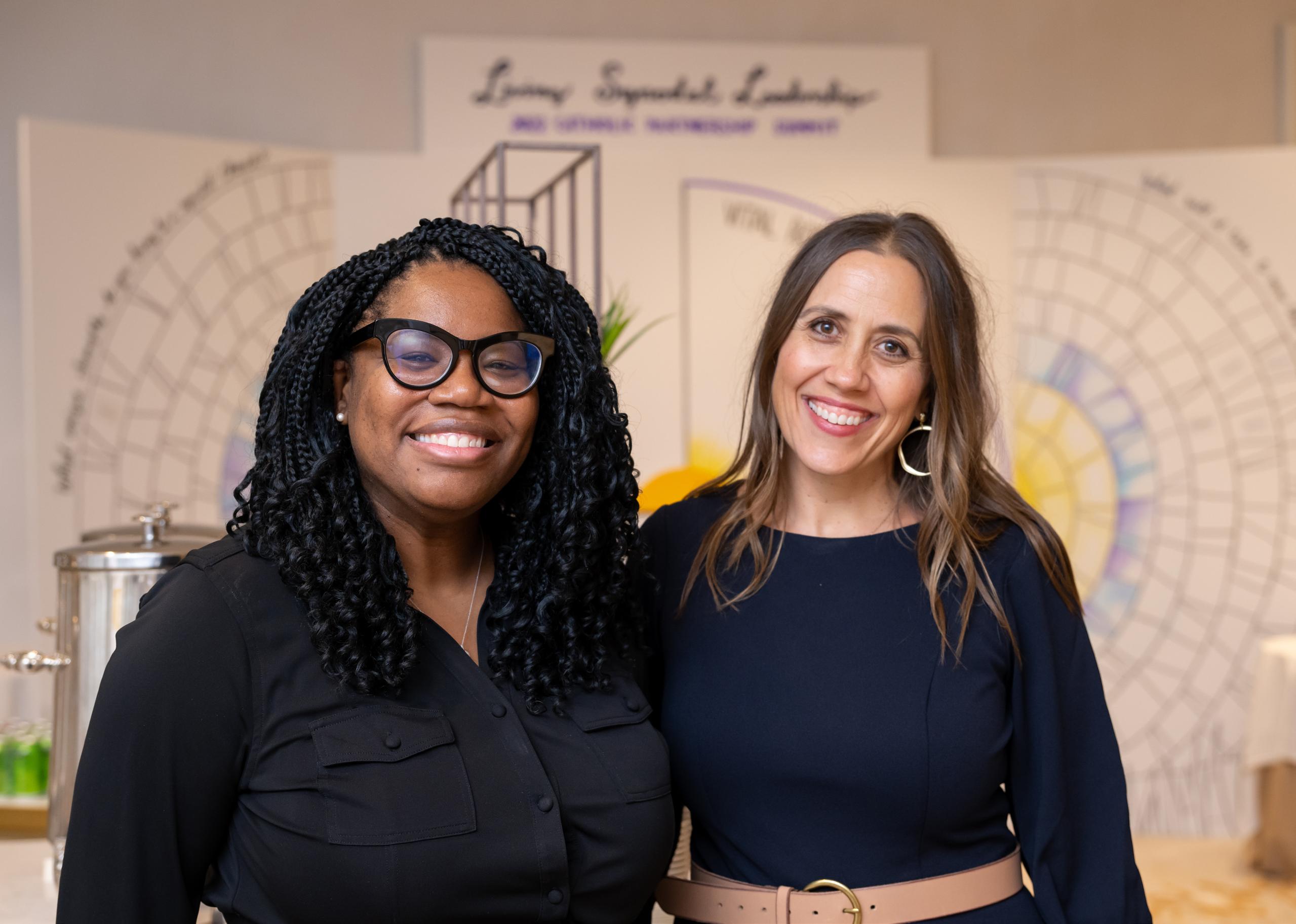
Young adults, Hispanics/Latinos, and people of color have been historically excluded from leadership. The Synodal process has presented the opportunity for the Church to invest in and include these communities
going forward by creating mentoring and leadership training programs to help transition into leadership roles, welcoming them to our parishes, and providing multiple ways for them to connect to the parish and providing pathways to leadership and active Church life.
A key part of the Synodal process involves openness and commitment to expanded and innovative methods of leadership, governance, outreach, and evangelization in the Church. Encouraging and supporting innovation is part of how the Church will remain relevant and agile in carrying out its mission. Through supporting new initiatives with leadership and funding, being open to change, disruption of the status quo, failure, and discomfort, as well as creating spaces to encourage and support innovation, the Church can thrive.

The Synod on Synodality has raised among the People of God many issues which have led the Church to consider both how it operates and how it leads. The call to synodality and becoming a synodal Church from Pope Francis presents a bold vision for the future of the Church.
In the following essay, Rev. J. Bryan Hehir, Secretary for Health and Social Services, Archdiocese of Boston, Montgomery Professor of the Practice of Religion in Public Life, Harvard Kennedy School (retired), and member of Leadership Roundtable’s Board of Directors, offers insight into the comments offered by Cardinal Mario Grech during his keynote at the 2022 Catholic Partnership Summit, an understanding of the Synod as an ecclesial event, and a history of synodality in Pope Francis’ pontificate as context for this report and the recommendations it puts forth.
The 2022 Catholic Partnership Summit took as its title and theme, “Living Synodal Leadership: Our Call to a United Church.” Appropriately, the gathering was addressed virtually by Cardinal Mario Grech, the Secretary General of the Synod of Bishops, who took time away from his work reviewing thousands of Synod reports from across the world to offer a special address to the leaders gathered in Washington, D.C.
In his vigorous presentation filled with hope and enthusiasm about the progress of the Synodal process
thus far, Cardinal Grech highlighted themes from the many talks the Holy Father has given during the past several months about the purpose and methods of the Synodal journey. The dominant idea, which Pope Francis returns to often, is that the “Protagonist” of the Synod is the Holy Spirit. As the Holy Father has made clear, the Church is called to listen to, and watch for, the guidance of the Spirit at each stage of the Synod’s development. Equally important is the recognition that the Synod is an ecclesial event arising from the nature of the Church.
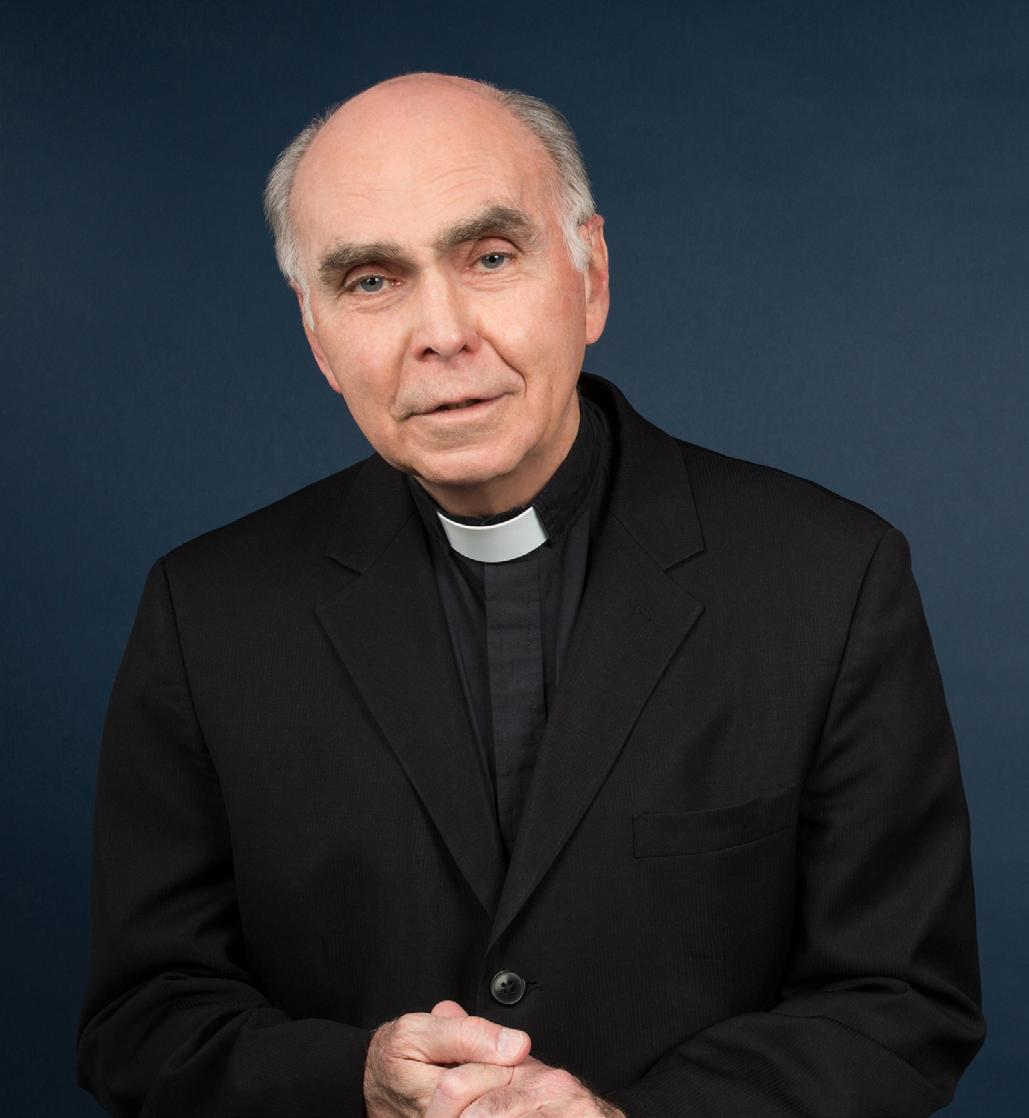
As Cardinal Grech noted in his presentation, the Synod is not a parliamentary meeting or simply one surveying public opinion in the Church today, but a genuine listening to the People of God and the Holy Spirit.
It is important to understand the ecclesial nature of the Synod, detailed by Cardinal Grech and envisioned by Pope Francis, as it forms the basis for all that took place during the 2022 Catholic Partnership Summit and all that is presented here in this report.
To understand the Synod as an ecclesial event, we look first to the Second Vatican Council, the great ecclesial event of the last century which was the catalyst for our synodal work today. Next, we consider the major themes used by the Holy Father in describing the Synodal process, so we can lastly understand the role of the 2022 Catholic Partnership Summit and its resulting recommendations as a part of our ongoing work to become a synodal Church.
The Second Vatican Council, the twenty-first ecumenical council in the history of Catholicism, was the only council meeting that focused on the Church itself. The two principal texts were The Dogmatic Constitution on the Church (Lumen Gentium) and the Pastoral Constitution of the Church in the Modern World (Gaudium et Spes).
Lumen Gentium arose early in the first session of the Council and became a touchstone for the bishops throughout the rest of the Council. While the conciliar document did not address the concept of synodality directly nor give it the weight Pope Francis has provided for it, the point to be made here is that embedded in Lumen Gentium are ideas which provide a foundation for the role of synodality in the Church. These ideas include:
1. the Church as a communion in itself and a communion among local churches;
2. collegiality as the principle which joins the bishops of the universal Church with the Pope in the governance of the whole Church;
3. the primacy of the Church as community
which the institutional church is designed to serve;
4. the emphasis on the role of the laity throughout the Council.
In the planning for the Council, it was always envisioned that a document on the internal life of the Church would be central. The companion text, Gaudium et Spes: was not expected; this last document of Vatican II was the surprise of the Council; it grew out of the Council itself. In the post-conciliar era of the Church, however, Gaudium et Spes has been seen as the complement to Lumen Gentium. It now provides the ecclesial foundation for the Church’s social ministry and teaching. Its entire content reinforces Pope Francis’ repeated teaching that synodality is not simply about the Church, but about the Church’s service to the world.
The concept of synodality is not a new idea. It is rooted in the Christian tradition and has long been a staple of the polity of Eastern-rite Catholicism. Pope Francis clearly sees it as a needed catalyst for the Church today. Popes often leave a legacy of their service to the Church, and Francis’s legacy will be importantly tied to the impact of synodality on Catholicism. Much of what he says about synodality reflects broader dimensions of his papacy.
First, the process of synodality is a journey—a walking together as an ecclesial community.
Second, the journey in turn involves an exercise of discernment.
Third, discernment, in turn, engages the Church, in all its members, in an encounter with the “protagonist” of the journey, the Holy Spirit.
Fourth, a key objective of this process of synodality is inclusion, the invitation to the entire church to be active participants in the journey. Inclusion has been a goal of this papacy since its inception; the call to the Church at every level to reach out to the margins of societies, to the “existential peripheries” which exist in the Church and in society, locally, nationally, and globally.
Fifth, the dynamic of the journey of synodality requires
a process of listening among the participants; listening in the Holy Father’s conception is the key to unity in the Church.
Sixth, the Pope specifies the goals of synodality in three terms: communion, participation, and mission. These are extensions of Vatican II, terms found there but needing a new infusion of grace and effort in the Church today.
Leadership Roundtable, through its staff and Board, has been deeply committed to Pope Francis’s call to shape a synodal Church. Among the many goals of synodality Leadership Roundtable has focused on, the requirements for the leadership needed at every level of the Church, from the papacy to the parish, is essential if synodality is to realize its potential. From its inception, Leadership Roundtable has focused on creating a “culture of co-responsible leadership,” which in many ways has prepared it to be a valuable partner in the journey of synodality.
In four working sessions, the 2022 Catholic Partnership Summit brought together leaders with deep and diverse experiences in the Church and civil society. The
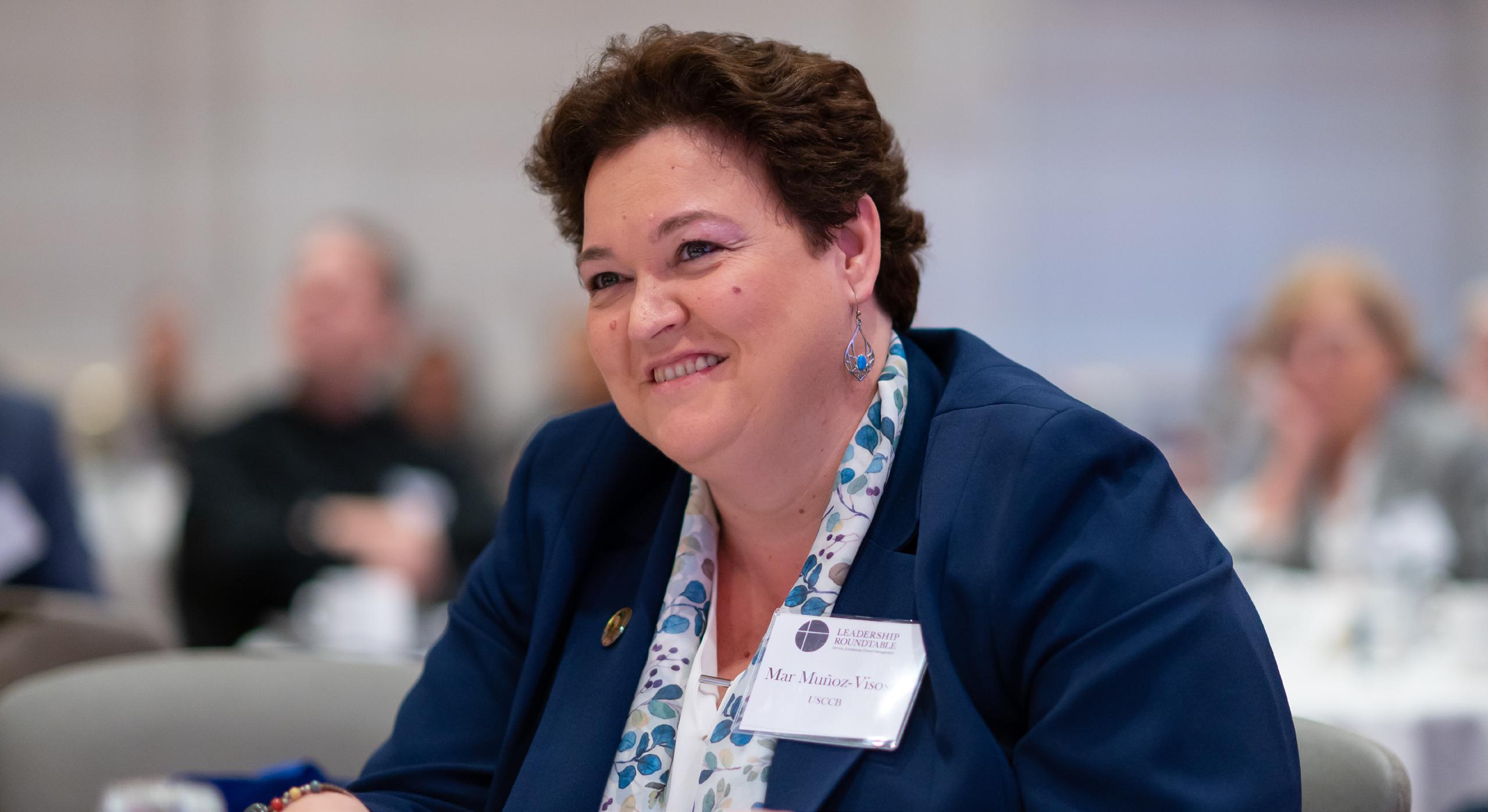
participants represented a wide range of organizations, a diversity of professional backgrounds and education and a common commitment to the life of the Church. In many ways the panels creatively represented intergenerational experience as well as ethnic and racial diversity.
By moving from a generalized assessment of synodality in the first session through issues of engaging pluralism in the Church and by focusing particularly on the role of women in shaping Catholic life, the four sessions created both a sense of solid hope for the future and a catalog of challenges for the journey of synodality.
The publication of this report on the 2022 Catholic Partnership Summit is meant to share with readers our sense of hope and our commitment to the journey before the Church in 2023 and 2024. The report’s purpose is to engage readers in the synodal journey, to catalyze conversation from the parish to the Synod itself in 2023 and 2024, and to engage leaders at many levels of the Church the way the participants at the Catholic Partnership Summit shared through their ideas, their recommendations, and their plans to enhance the life of Synodal Catholicism.
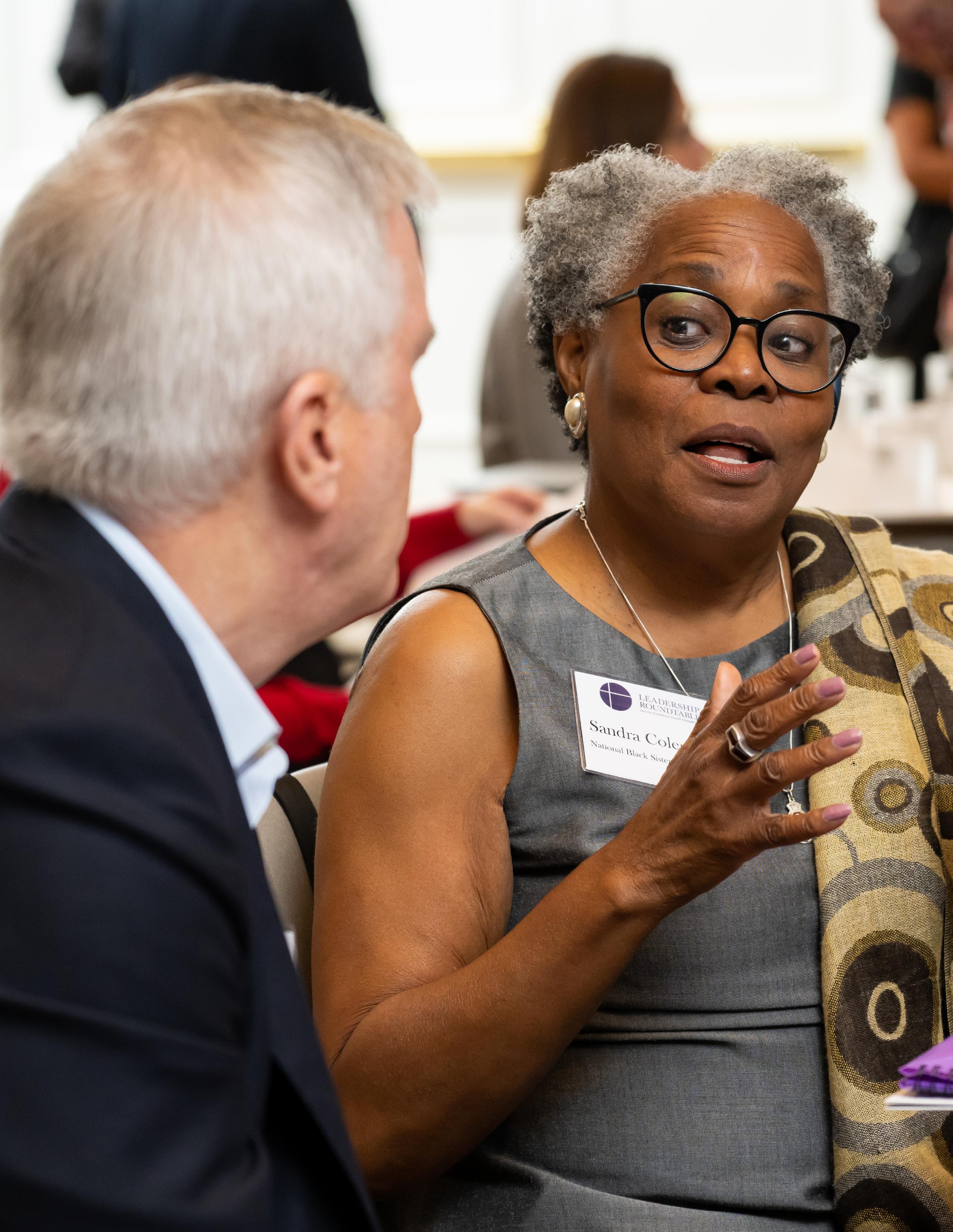
Cardinal Mario Grech offers keynote address on synodality in live stream from Italy

“A decision-making process in the Church always should begin with listening. Because only in this way, can we understand how and where the Spirit is going, and where the Spirit wants to lead in the Church.”
Cardinal Mario Grech, secretary general of the Synod of Bishops, offered this guidance to more than 230 leaders gathered in Washington, D.C. for the 2022
Catholic Partnership Summit in an opening keynote address delivered via Zoom from Frascati, Italy. Grech was in Frascati working with leaders from across the world to review and synthesize the Synod reports that reached the Vatican from the first phase, the diocesan phase, of the global process.
The initial results of the global Synod have been
A decision-making process in the Church always should begin with listening.
–CARDINAL MARIO GRECH
“astonishing,” he said, noting that nearly every bishops’ conference in the world submitted a report. He noted that the Vatican also received more than 1,000 additional individual submissions, each of which will be taken into account as leaders prepare the global synthesis report.
“And this shows that the Holy Father, when he is addressing synodality, is really touching an important core in the People of God,” he said.
Grech’s keynote address both updated the largely U.S.based Catholic leaders on the ongoing Synod process and set the tone for their exploration of the theme of Living Synodal Leadership: Our Call to a Unified Church by providing a theological and contextual foundation of synodality and the Synod process.
Quoting Pope Francis’ encyclical Evangelii Gaudium, Grech noted that the Holy Father has recognized that within all baptized People of God, there is an instinct that helps them to discern what is truly of, and from, God.
Any consultation of the People of God must include those on the margins, Grech noted, adding that otherwise “there would not be a synodal process because the discernment of pastors emerges from, and together with, an act of listening to the People of God.”
He directly addressed the issue surrounding inclusion of two groups of Catholics who are often marginalized in the Church: divorced and remarried persons, and those in same-sex relationships.

“These issues are not to be understood simply in terms of doctrine, but in terms of God’s ongoing encounter with human beings,” he said. “Might this be an opportunity for the Church to listen to the Holy Spirit, speaking through them also?”
Grech referenced several issues that have arisen during the first phase of the Synod process, some which were reflected in the results of the Synod in the United States, released just days before his address, including unity among the People of God. Those dioceses that throughout the Synod process have sought to include all members of the body of Christ and to unite them are stronger than those who separate them, he said.
He cautioned leaders that the Holy Spirit alone can impose limits on synodality, also noting that a synod is not a democracy, but a process of mutual discernment.
“What affects everyone must be deliberated on by everyone,” he said. “The conclusions of the Synod are not an expression of the vote of the majority, but an agreement in the faith of the Church.” As such, he encouraged leaders to trust that the Holy Spirit acts in and with the People of God and is not merely “the property of the ecclesial hierarchy.”
“In my opinion, here we have a key that enables us to evaluate and rethink — rethink the dynamics present in the Church,” he said.
“Bishops need to listen to the People of God to communicate effectively and credibly,” he said. Early in his keynote, he shared a similar wisdom often imparted to his brother bishops: “There is no flock without a shepherd, but there’s no shepherd without a flock. So even bishops have this duty to listen to their people.”
Both human understanding and human consciousness change and deepen with time, and Grech noted that Pope Francis has warned against a vision of Church doctrine that is monolithic and fails to acknowledge humans and humanity.
“Hopefully, this Synod will empower the People of God,” he said, going on to add that, “All the faithful have a place in the Synod and they have the opportunity to express themselves. This listening is a true pastoral conversion of the Church.”
The global Synod process is set to conclude in October 2024, with two gatherings of bishops in Rome — one in Oct. 2023 and one in Oct. 2024. For the first time,

those gatherings will include a woman in a voting role: Undersecretary Sr. Nathalie Becquart, XMCJ.
“I firmly hope that the present Synod may be timely, at least an experience that would inaugurate a much needed spiritual, systematic, and missionary renovation for the whole Church,” he said.
While the current Synod will culminate with the gatherings in Rome, Grech encouraged leaders to continue engaging in synodal consultations and fostering the enthusiasm that has been evident among those who have taken part in responding to the call to walk together.
“Please go on. Continue with this process, with this listening process,” he said. “When we say that we are listening to one another, we are also saying we are listening to the Holy Spirit. And for me, this is something sacred. And it was about time that we came around to recognize this wealth, this richness in the Church.”
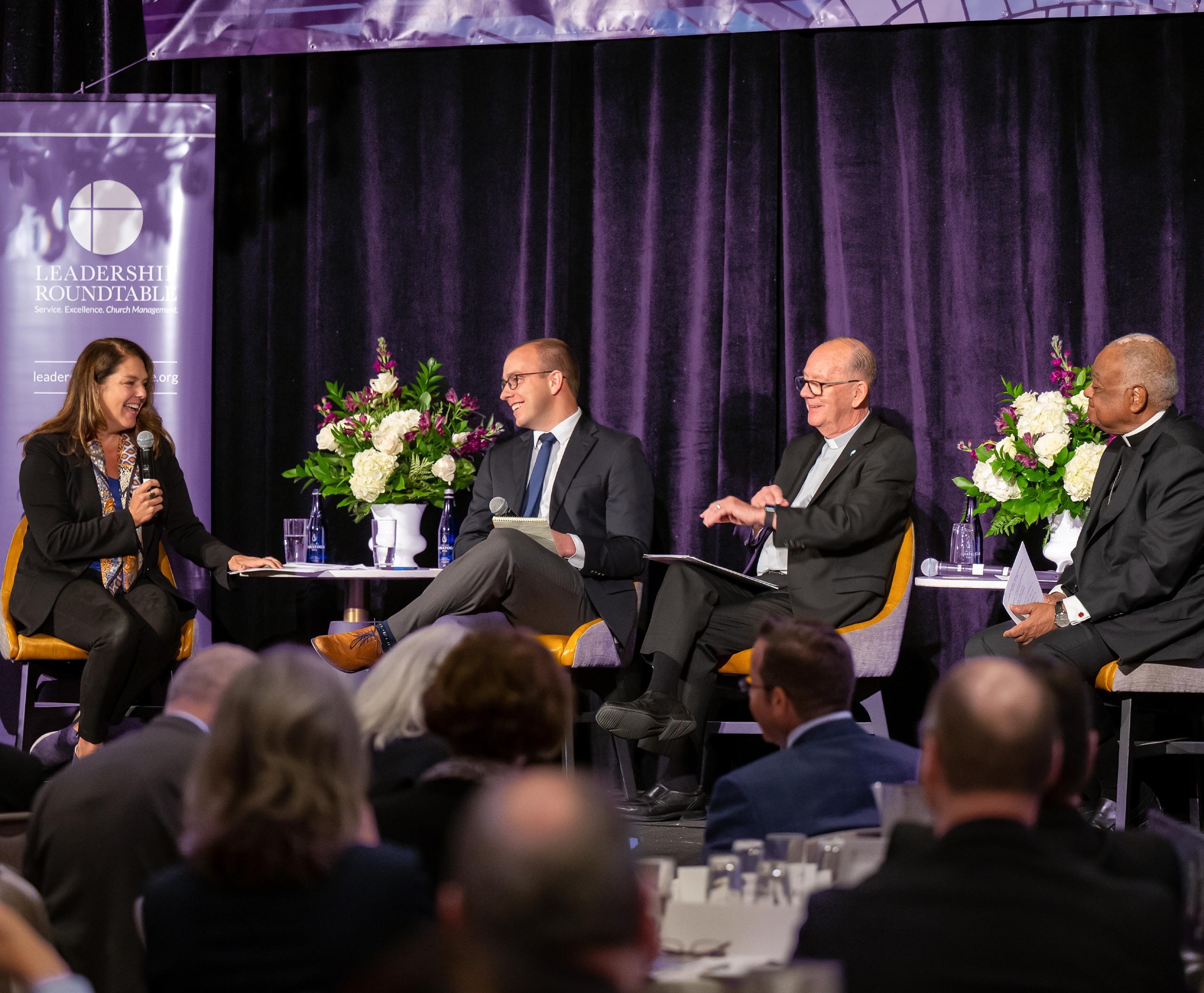
In one of the “58,000 Cups of Coffee” conversations hosted by the Diocese of Davenport during the Synod, a man who grew up in a non-denominational Christian church shared how he recalled his family being part of founding that church.
As they worked to establish their church, everyone knew that it took all of them — every member — to make the community work. Now, an adult and a Catholic in the Diocese of Davenport, the man shared that his experience in the Catholic Church was noticeably different. Where every member of his childhood church was needed to make their community work, at his Catholic parish, he could be anonymous.
Patrick Schmadeke, director of evangelization for the Diocese of Davenport, shared the story of his conversation with the man during the 2022 Catholic Partnership Summit to illustrate some of what the Church has learned in the ongoing Synod process.
“There was sort of — at least in our diocese, among many people — a perception that the Church is sort of this sociological fact that exists and endures through
time and space independent of my existence,” said Schmadeke. “We really have to turn and look in the mirror and wonder: How do each of us contribute to our parish communities, in the broader Church, and how can we invite greater participation on the part of others in the life of the Church?”
Schmadeke was one of the leaders of Davenport’s synodal process and served on the opening panel of the Summit along with Rev. John Hurley, CSP, and Cardinal Wilton D. Gregory.

The opening session focused on a theme of Our Synodal Roadmap, looking both at our collective Synodal journey thus far — what has worked, what has not worked, and what has been learned through the Synodal process by parishes, dioceses, and leaders — and what is needed to continue becoming a synodal Church.
“Learning to live synodaly will help heal the divisions and lessen the chasms within our Church, our country
and our world,” noted Kerry Robinson, executive partner of Leadership Roundtable and moderator of the panel. “The potential of this invitation to dream new ways of being in relationship to one another and a more faithful way of being Church is a gift of new life not to be squandered.”
“This Synod on Synodality is a call and an opportunity for the entire global Church to walk together and to listen to one another in our local communities,” Cardinal Gregory said. “I am deeply grateful that Pope Francis himself has been a model of both listening and accepting and loving those in the Church, even those that might disagree with him.”
Schmadeke shared that in the Diocese of Davenport, each conversation over coffee started with two simple questions: What breaks your heart? And what fills your heart?
“What’s on people’s hearts is what is a directive for them personally,” Schmadeke said.
Fr. Hurley, the founder of New Evangelization Strategies, has been hosting synods in the Diocese of
San Diego for years, leading both a synod on Amoris Laetitia (the Joy of Love) in 2016 and, beginning in 2019, a synod for young adults, “Christ Lives: A Time of Dreams and Decisions.” He also has been helping lead the current Synod process in San Diego.
In each synod, Fr. Hurley noticed an eagerness of those who participated to share their experiences.
“In both of these synods, parishioners who were engaged in the process did not hold back,” he said. “And it’s OK for us to hear, as Patrick was saying, what is on the hearts of our faithful and also those who struggled.”
In the Archdiocese of Washington, Cardinal Gregory, who is archbishop, said that the Synod revealed that parishioners really honor and support their priests and pastors. But the Synod organizers told him: “Cardinal, the bishops did not fare as well.”
“I was not offended, first of all, because I think I needed to hear that,” Gregory said of the criticisms of the bishops that arose during the Synod. “But it also gave me impetus to do what I have always really felt: I am most ‘bishop’ when I’m with my people and
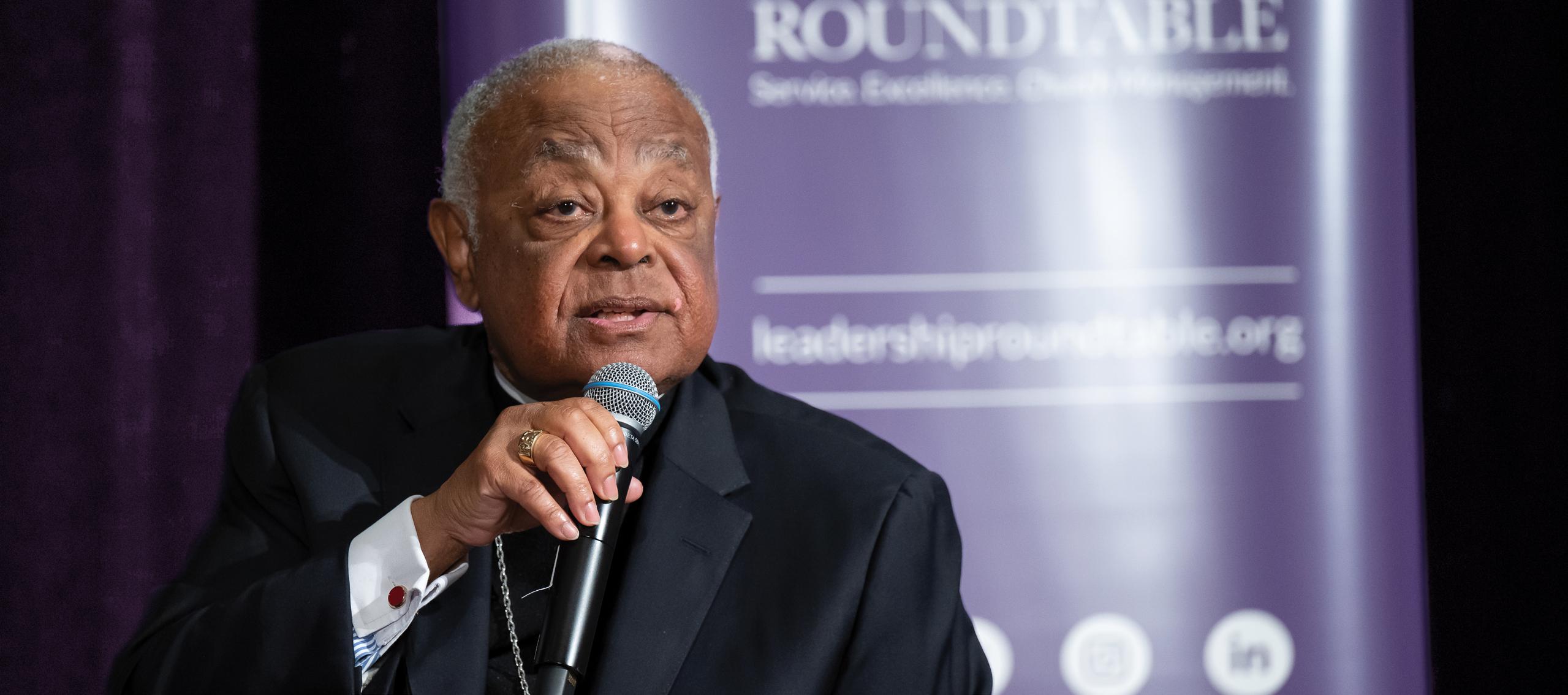
perhaps least ‘bishop’ when I’m in the office. So I really felt it was an impetus for me to get out more directly and be involved in the ordinary parish life of my people.”
The Synod experiences in Davenport, Washington, and San Diego mirror those in dioceses across the United States. Just days before the 2022 Catholic Partnership Summit, the United States Conference of Catholic Bishops issued their synthesis report on all the diocesan Synod consultations in the United States.
Among the core themes that emerged, Catholics across the country highlighted a desire for a more welcoming Church, similar to what was raised in Davenport.
Catholics also raised the many wounds felt throughout the body of Christ, which Hurley noted were also raised in the consultations in San Diego.
And Catholics across the country, not just in the Archdiocese of Washington, called out the bishops for leadership failures in recent crises.
But the report also noted that Catholics across the country are eager to help the Church heal and move forward.
“Just the act of listening has generational, communal impacts,” Schmadeke said.
have walked away and taken her family with her.
Fr. Hurley said he learned early from a professor at The Catholic University of America that “you can listen people into existence.” The Church, he said, is called to accompany people and that means knowing where they began their journey — something learned by listening.
While he noted how years of not listening led many to leave the Church, he encouraged leaders to not allow listening to be the end of the process, but to start looking to what must come next: action.
“We have heard from the faithful, and I think, it’s now consulting with them. That means the participants and those engaged in the process are collaborating with us to come up with some resolutions,” he said.
“Authentic synodality is truly a co-responsible experience and there is nothing to fear except fear itself,” Fr. Hurley went on to say, applying the famous quote by President Franklin D. Roosevelt to the Synodal processes. “The richness of diversity in consultation does not happen by accident in our dioceses. We have to be intentional about making sure all the voices are there before we can even begin our conversation.”
Who is at the leadership table and their formation as leaders are also key, according to Cardinal Gregory.
Schmadeke detailed a conversation during the Synod in Davenport with a woman, a former parish leader, who left the Church after she felt she was pushed out. Years later, she now attends a non-Catholic church in town. Had she been listened to back then, like she was during the Synod process, she told the diocese she would not
“One of the ways that we can live and lead in a synodal way as we continue is for bishops, together with Church leaders, to consciously hire and retain and form qualified clergy, religious, and lay leaders — people in leadership roles,” he said.
Formation for leaders, called for in canon law, is critical for the Church as it continues living out the call to synodality, Schmadeke said. In their reflections on the Synod process in the Diocese of Davenport, organizers
agreed that formation of leaders must be a top priority.
voice of the Holy Spirit,” he said.
“How well are those leaders formed in human, spiritual, intellectual, and pastoral interventions?" Schmadeke asked rhetorically. “Because that is what is the foundation and groundwork for this to be lived out well.”
He went on to add: “Our formation as leaders, and as we facilitate the formation of others, comes down to the relationship between the person and the Holy Spirit in the context of the faith community. So let’s continue to attend to these things.”
Noting the strong polarization that exists in Washington, D.C., home of his diocese, Cardinal Gregory emphasized that there is a need right now for civility and compassion for one another, among all people of faith. He also talked frankly about the discourse and division among the U.S. Bishops.
Gregory said that while disagreement has always been present among the bishops, the division noted in the national synthesis report has recently worsened.

“Given the division and the discord that is all too common and too frequent, this Synod process is helping us to pause and to focus ourselves to hear the
He expanded upon this concept saying, “Listening has to be an open-ended activity. I don’t listen to you to catch the flaws in what you are saying. I don’t listen to you in order to prepare my reply. I listen to you to learn from you. And it doesn’t mean that I always agree with you. However, listening is an act of respect for the person. I listen to people because I believe that they have a dignity that comes from God and they just might be speaking for the Holy Spirit.”
The Holy Spirit’s role in synodality and the Synodal process was also touched upon by Fr. Hurley, who noted that leaders need to be open to the Holy Spirit if we as a Church and as a People of God are going to live authentic synodality.
“Sometimes we get in the way,” he said. Recalling that Cardinal Mario Grech in his keynote address encouraged leaders to make room for the Holy Spirit in their synodal work, Hurley concluded: “I think that’s the key to the success of all of this.”
Cardinal Gregory offered similar advice, adding: “We need to ground everything that we do in the Church as members of the Church in prayer and not lose sight of how important prayer is — that we must be in, and we must engage in it, in order to do anything in our lives.”
Accountability is a key element in building synodal Church culture and restoring trust with the People of God.
• Strongly encourage every new pastor and new bishop to hold a synodal consultation with their parish or diocese within one year of appointment to help establish accountability and listening with their faith community.
• Ensure each parish, diocese, or Catholic organization has active and functioning boards, councils and/or committees that regularly meet, plan, and follow through.
• Create metrics around co-responsibility — i.e. number of lay, religious, and clergy participating to ensure a balance — and work to ensure each consultation or decision-making gathering meets those targets.
• Personally reach out to those who participated in the synodal process and invite them to deeper life in the Church, i.e. greater service if they are already involved, or ways to get involved if they are not active.
• Cultivate leaders within the faith community, set expectations, and review progress toward those expectations to help build accountability and ownership at every level.
Pope Francis has called upon the Church to become synodal — listening to the Holy Spirit, engaging all members of the body of Christ, especially those historically marginalized, in dialogue and discernment.
• Establish a process at the parish and diocesan level to review the results of the Synod in the U.S. and the global synthesis and understand where it aligns and diverges from the results of local consultation(s).
• Share and promote both the U.S. and global synthesis documents within faith communities by providing access to the full report as well as highlights and analysis and/or synthesis.
• Offer to host follow-up consultations to review and receive feedback from faith communities on the results of the U.S. and global syntheses and to develop actions or steps to take in light of the results.
• Invest in skill-building for clergy, staff, and volunteers, with a specific focus on the skills central to synodality: listening and discernment.
• Encourage and support personal development in human formation competencies that further support listening and discernment skills, including, but not limited to: history, arts, literature, emotional intelligence, and social skills training.
• Periodically host a synodal consultation within parishes, dioceses, or Catholic organizations that focuses on the experience of faith and accompaniment at the parish level: What fills your heart? What breaks your heart?
• Engage in a synodal process of listening and discernment to identify changes needed to create a synodal culture and develop recommended actions to move toward those changes.
• Take steps to ensure participation from diverse members of the faith community in any synodal process, including, but not limited to: direct outreach to the full community, hosting multiple sessions to accommodate schedules, and offering alternative ways of participating such as email or Zoom.
• Deliberately make time and space in every synodal consultation for the Holy Spirit through moments of silence, prayer, and by avoiding any efforts or questions that would drive the consultation to a predefined conclusion.
• Utilize available resources and best practices to ensure that the concerns and questions of those engaged through synodal processes are accurately captured, understood, and reported.
• Communicate openly with members of the faith community about the results of any synodal process and the next steps that will be taken.
• Build credibility by identifying concrete actions that a local faith community can take in response to the synodal consultations and results.
• Identify tangible ways to accompany members of a faith community, especially those who have been marginalized by the Church.
As the Church strives to become more synodal, there is a need for ongoing communication, information-sharing, and transparency so the ideals and purpose of synodality are understood and the outcomes are realized.
• Develop and share resources for formation in synodal leadership and the principles of synodality that can be utilized across the Church.
• Create a planning process that parishes, dioceses, or Catholic organizations can follow to adopt synodal leadership and the principles of synodality into management structures.
• Find ways to bridge the gap between the ideals of synodality envisioned by Pope Francis and the experience of the Synod by the majority of Catholics.
• Clearly communicate to faith communities the intended outcomes and purpose of any synodal consultation or process, including the ongoing Synod.
• Use and distribute existing resources on synodality from the USCCB and the Vatican to communicate the purpose and intent of the Synod.
• Develop and share communications around synodality and synodal leadership that can clearly and easily help people understand synodality.
• Develop a diocesan-level effort to educate clergy about the Synod and synodality.
• Incorporate coursework in listening and other social skills training into seminary curriculum.
• Develop a resource guide that parishes, dioceses, and Catholic organizations can use based on the U.S. and global syntheses.
Synodality requires leaders to seek out and engage with a diverse mix of individuals, particularly those historically excluded, those on the margins, and those who have left the Church.
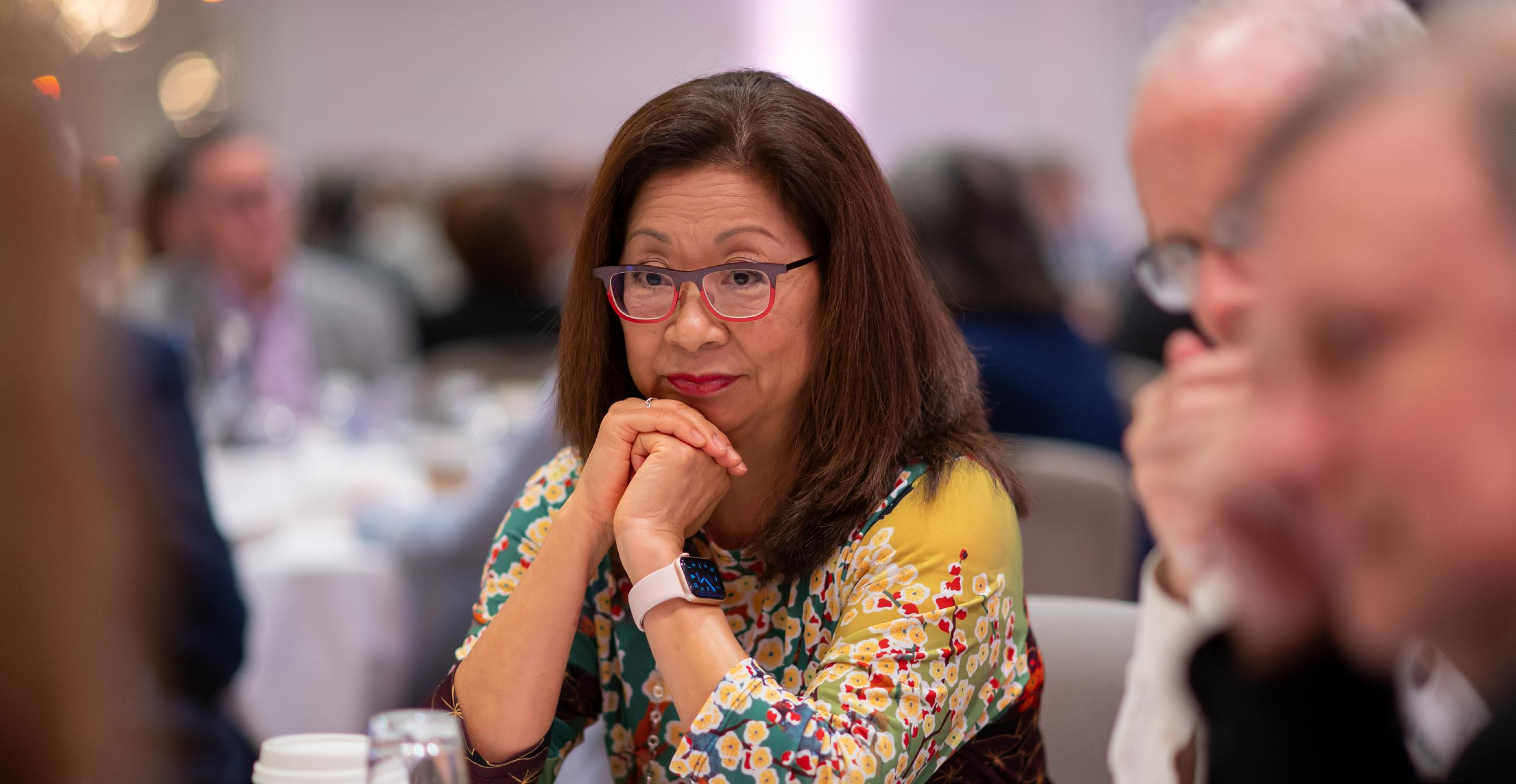
• Develop channels of communication that are open, accessible, transparent, and empower all members of the Church to be in honest and truthful dialogue.
• Use parish, diocesan, or organizational communication channels to share what is being done to engage those on the margins and to open those channels to those individuals.
• Meet people where they are online and develop procedures to actively and appropriately engage them in synodal dialogue in digital spaces as well as formal synodal consultations.
• Create a toolkit of best practices in synodal leadership that parishes, dioceses, and Catholic organizations can use to form their staff and volunteers in synodality.
• Seek out and connect to others who can amplify and share the synodal work happening in parishes, dioceses, or Catholic organizations and create networking opportunities to share ideas and best practices.
• Create opportunities to engage those who have left the Church, especially young adults, to understand their experience and to create avenues to help reconnect them to their faith.
• Ensure women and lay leaders are present at all decision-making tables of parishes, dioceses, and Catholic organizations.
• Work to include those historically on the margins into leadership and other decision-making bodies.
• Prioritize having a diversity of experience and thought represented in all leadership and decision-making bodies, and actively engage those who are historically excluded.
• Establish processes for actively engaging those who are outside of the majority in more than just synodal consultations, but in all aspects of Church life.

“It's very difficult to be open to not only truth-telling, but to receiving other people's truths,” moderator Dr. Amy Uelmen said as she opened the second panel of the 2022 Catholic Partnership Summit.
Pope Francis has called the People of God to unity. Yet, as many gathered at the Summit — as well as the Catholics who took part in the diocesan phase of the Synod — have acknowledged: There remains much that still divides people of faith.
Noting the first panel’s emphasis on the importance of listening as leaders, Uelmen, a professor of law at Georgetown University, challenged the second panel to consider the other side of listening: sharing or speaking one’s truth. And to explore how engaging in listening, sharing, and collective discernment serves to promote unity in the Church.
“What does it look like to face down some of our painful conflicts and areas of disagreement and get into this practice of truth-telling when this is so complex?” she asked.
The second panel of the Summit featured Bishop John Stowe, OFM Conv., Dr. Shannen Dee Williams, and Bob Bordone. The panelists discussed our call to Being One Church, sharing a mix of lessons from history and considerations of future actions to help unite us as Catholics.
For many Catholics, the ongoing Synod process is
the first time they have felt heard. The United States Conference of Catholic Bishops released their synthesis report in mid-September and noted that among the more than 700,000 Catholics who took part, many felt it was the first time the Church really listened to them, even as they shared and raised many wounds and conflicts within the body of Christ.
“As I experienced in the sessions held in the Diocese of Lexington, people everywhere were surprised by the great amount of agreement they discovered when they actually listened to each other and heard what was being said,” remarked Bishop Stowe, who is the bishop of the Diocese of Lexington.
Many who have felt heard for the first time by the Church in the Synod process are those who have experienced being actively excluded and harmed by the Church in the past.
“When people are reduced to labels, causes, and statistics, they’re easy to characterize and even easier to dismiss,” Bishop Stowe said. “The unity we desire in the Church should not be confused with uniformity. Diversity is a blessing. It is what makes us genuinely Catholic.”
Dr. Williams, an historian who studies the experience of Black Catholics in the United States, encouraged leaders to look at what is happening today to reconcile with those harmed in the past as they seek to build bridges and work toward unity.
“The unity we desire in the Church should not be confused with uniformity. Diversity is a blessing. It is what makes us genuinely Catholic.”
–BISHOP JOHN STOWE, OFM CONV.
Williams is the author of “Subversive Habits: Black Catholic Nuns in the Long African American Freedom Struggle.” Her book shares the more than 15 years of research and oral history interviews she conducted to unearth, understand, and tell the story of Black sisters in the United States.
“I was a budding historian of the African American experience, and one thing that I'd already known was that one of the greatest weapons of White supremacy was its ability to erase the history of its violence and its victims,” she said. And the Church had, for decades, buried the truth about Blacks in the faith and in religious life.
Williams shared that she, a cradle Catholic, had no idea before she began her research that Black sisters
both not only existed, but once led ministries in her hometown of Savannah, GA. It wasn’t until she found a 1968 article announcing the formation of the National Black Sisters Conference that she had ever seen a Black sister outside of fictional Hollywood films.
“I was able to recover a voice of a group of Black American Church women whose lives, labors, and struggles have been systematically ignored, routinely dismissed as insignificant, and too often, reduced to myth,” Williams said.
She said she also found that the truth of Black sisters’ lived experiences didn’t align with the existing narratives of American Catholicism and the story of Catholic sisters in the United States.
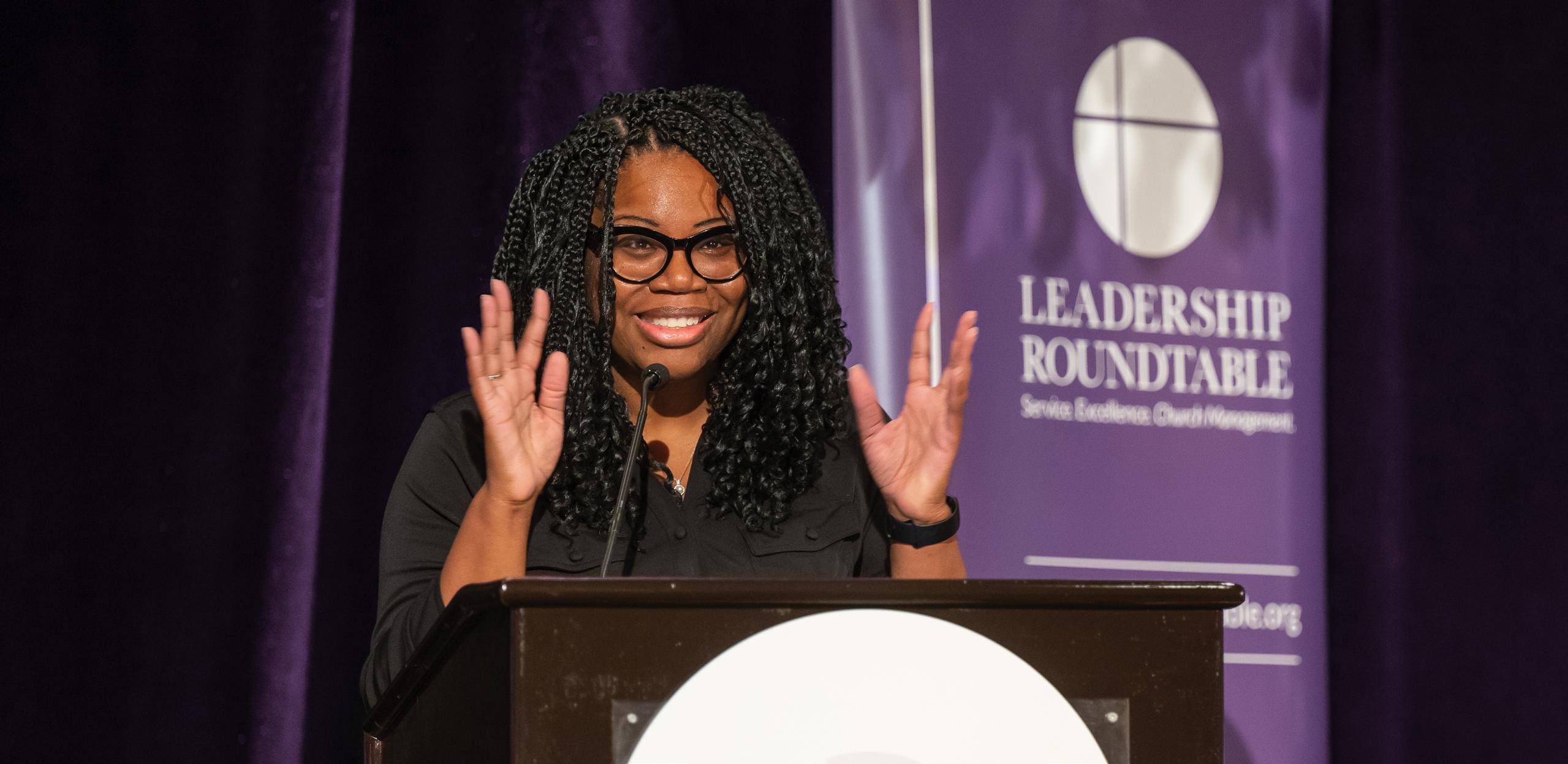 Dr. Shannen Williams
Dr. Shannen Williams
“When you are confronted with the silent past, the greatest responsibility of the historian and the most radical thing any person can do is to tell the story that was never meant to be told.”
–DR. SHANNEN DEE WILLIAMS
“Instead, from a host of widely-ignored archival sources — civil church records and out-of-print books, periodicals and over 100 oral history interviews — I bore witness to a profoundly unfamiliar history that disrupts and revises much of what has been said and written about the U.S. Church and the place of Black people within it,” she said.
Williams’ research revealed a history of Black women denied their call to religious life because of their race; of Black sisters starting their own religious orders and a conference so they could live out their vocations; and of Black sisters actively working to desegregate religious life in the United States.
“When you are confronted with the silent past, the greatest responsibility of the historian and the most radical thing any person can do is to tell the story that was never meant to be told,” she said. “And in that journey, and what I have seen in my own work has been not only discovering the power of Black historical truth-telling and Black Catholic historical truth-telling, but also a profound grief, a profound unity of grief, not only between Black sisters who have suffered the sins of racism in our society, but also profound grief on the part of White sisters who been complicit in that history.”
Williams said we will never know how many vocations were lost or the depth of the harm experienced by the Black community, and that is why history matters. But she questioned those inflating the current divisive climate in the Church as somehow worse than the divisions of the past.
the heroes and heroines who responded.
Not only did her research reveal the truth of U.S. Black sisters but also revealed untold stories of White bishops speaking out against the sin of racism and calling for reparations for the Black community, particularly women, harmed by the Church and of White priests fighting to get Black schools accredited. Her research also led to women’s religious orders, which previously denied Black women access, undertaking a process of reconciliation and making reparations.
Pope Francis teaches that our differences and even our conflicts are not to be feared, Bishop Stowe said.

“We can't really be one Church if we aren't able to have disagreements in a civil and constructive manner,” he said. “We certainly can't be one Church if decisions that affect everyone are put to a majority vote, if we ignore the misgivings of the minority, much less if a
“Is it?” she asked. “It is worse than slavery or, like, Jim Crow?”
Williams suggested that within the horrific stories of the past are also the stories, and blueprints for action, of
hand-selected few decide for all. Much less can we be one Church if we sweep our differences and difficulties under the rug, as we did with reports of abuse, as we continue to do with systemic racism, as we have with our policies of exclusions, so painfully felt by women, LGBTQ persons, people of color, and so many others.”
Bordone, conflict resolution expert and founder of the Cambridge Negotiation Institute, posited that “Conflict is where the Spirit is working.”
“I would say that being one Church means having conflict,” he said. “It means embracing conflict.”
mean-spirited and harsh. Asserting one’s experience in a way that others actually hear and listen to takes time, energy, and skill, Bordone said.
“As long as, institutionally, we do not create conditions that allow for the surfacing of differences — whether that’s for a queer person, or a divorced person, or a woman, or a person of color — it’s going to be even harder in our Church to see conflict resilience,” he said. “We need to find a way, as a Church, to make it safer for people with different experiences to speak their experience. And I think when we do that, we learn about richness and we learn about the way in which the Spirit is working.”
Bordone detailed how the Church has a history of responding to national and global conflict with solutions that have endured. He noted the formation in 1909 of Catholic Charities to serve the record number of immigrants coming to the U.S. and how it continues to be one of the largest providers of social services today. And he spoke of the formation in 1943 of Catholic Relief Services to provide for the millions displaced by World War II and how it continues to serve those in need across the globe.
The current polarization in the Church and the world could be the next catalyst for Catholic action, he suggested.
Bordone encouraged leaders to develop what he calls “conflict resilience.”
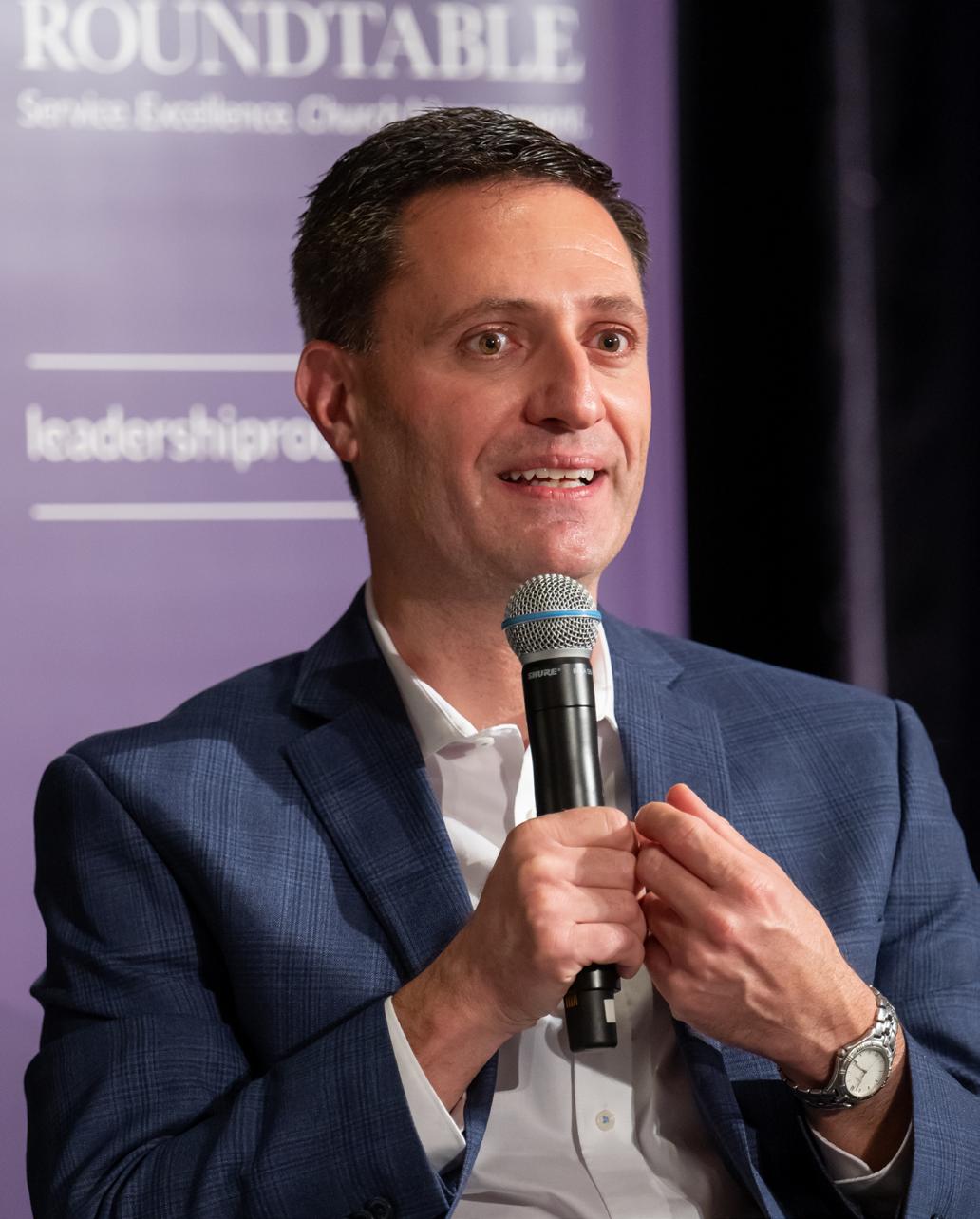
Talking about disagreement in authentic ways, even if it doesn’t result in resolution is a key part of conflict resilience, he said. So is assertion, though sometimes assertion can come across as tepid and hesitant, or as
“What if in this moment, our bishops with our support started the U.S. Conciliation Service?” he suggested. “Using the great wisdom we have in this room and the resources, we could build something that I think could really, fundamentally transform this Church and our society.”
Through examples of his past work with dioceses, Bordone said that unity can often be found when both
parties are open and vulnerable. When the Church or its leaders only listen and do not make themselves vulnerable by also sharing their stories, their “listening” is perceived as not genuine.
“If we are going to enter into this process, in the next step, it can’t just be one-way listening, there needs to be mutuality of sharing of stories and of suffering and challenge and joy and goodness,” Bordone said.

Williams cautioned that not everyone will yet be in a place to be open and vulnerable but we do not need
to wait for everyone to be ready to start having the conversations. Sharing the example of the Black sisters in their struggle to get their schools accredited, she said that not every White sisterhood was willing to help them out, but three or four were and that was all they needed to get started.
“The reality is, it’s going to be messy,” she warned. But she offered this hope to those who are engaging in the work to address conflict and seek unity: “Courage comes from the Holy Spirit.”
“I would say that being one Church means having conflict,” he said. “It means embracing conflict.”
–BOB BORDONE
It is vital for the Church to strive to include all members of the body of Christ in Church life, especially the marginalized — young adults, people of color, women, low-income individuals, and LGBTQ Catholics.
• Create organizational structures that prioritize and actively seek to ensure diversity of representation in all leadership circles.
• Evaluate how parishes, dioceses, and Catholic organizations interact with diverse communities and take steps to actively avoid treating those communities as “other.”
• Evaluate organizational structures, including leadership recruitment processes (including advisory bodies) to embrace diverse people and ideas.
• Welcome those experiencing poverty and homelessness into active life in the Church.
• Seek leaders of diverse income levels for Church leadership roles and take steps to accommodate the varying needs of individuals — such as offering childcare and meals during parish council and other meetings, or scheduling meetings on weekends or evenings.
• Identify authentic ways of engaging with communities that are largely absent from leadership — such as people of color, young adults, immigrants, people with disabilities, LGBTQ Catholics, those experiencing poverty — to build relationships based on dignity and respect.
• Utilize synodal processes to evaluate and consider how to provide missionary and pastoral care to all individuals, especially those on the margins.
The Church needs to become a model for, and a teacher of, how to live in unity among the great diversity and polarization of our world with a particular focus on charitable dialogue and conflict resiliency.
• Create and facilitate spaces of transparent dialogue where conflict can be addressed openly and where every participant is treated with dignity and respect.
• Employ restorative justice practices within faith communities to facilitate constructive conversations on difficult topics.
• Work to reframe how faith communities view and approach conflict by regularly facilitating spaces of encounter.
• Maintain transparent, accessible avenues for sharing feedback and experiences beyond synodal consultations.
• Include principles of synodality in all pastoral planning processes.
• Invest in training for conflict transformation and facilitation for leaders in parishes, dioceses, and Catholic organizations.
• Create and train a conciliation ministry at the parish or diocesan level that can be mobilized to properly facilitate difficult conversations and utilize restorative justice practices as conflicts arise.
For positive transformation to occur, we must do the hard work of changing the ways we lead in the Church by encouraging leaders to find energy to learn new things and change patterns.
• Commit to anti-racism in parishes, dioceses, and Catholic organizations by leveraging reporting and investigation practices to address instances of direct discrimination based on race.
• Seek expert consultation to identify institutional racism in parish, diocesan, and organizational structures, establish a protocol to remove racist policies or practices, and seek ways to make amends with those who have been harmed.

• Establish a racial justice committee that meets regularly to reflect upon and address institutional racism and commit to making changes.
• Provide reconciliation services and a safe place for those who experienced racism and discrimination to seek support and a path forward.
• Create opportunities for real relationships to be built among people of different racial and ethnic backgrounds in our parishes.
• Provide formation to leaders of faith communities that emphasizes qualities including, but not limited to, humility, vulnerability, openness, and curiosity.
• Foster an organizational culture that views mistakes as learning experiences, not failures, by offering regular feedback, training, and support to all individuals that allows leaders to learn and grow from mistakes.

The blunt question is one that many Catholic women have grappled with at some point in their lives. And it was a question that, when posed to Sr. Teresa Maya, CCVI, by her college roommate Julia, it never left her mind or heart.
“I have been answering Julia’s question my entire life,” she said.
Sr. Maya of the Sisters of Charity of the Incarnate Word, and a member of Leadership Roundtable’s Board of Directors, was one of four panelists at the 2022 Catholic Partnership Summit who led the conversation surrounding The Vital Role of Women’s Leadership in the Church. She joined Dr. Carolyn Woo, Casey Stanton, and Dr. Kathleen McChesney on the panel.
Synthesizer David Gibson, director of the Center on Religion and Culture at Fordham University, said that the panel and the table discussions for the session sought also to answer another fundamental question: what is a women's role before the face of God and before the face of the Church?
“Women are not the guests of the Church,” Dr. Carolyn Woo said. “And we don’t need invitations. We are members of the family.”
Often, women are treated as guests of the Church, expected to be charming, good-natured, and to not ask
too many questions, said Woo, who has held several leadership roles in the Church, and recently wrote a book on women’s leadership in the Church.
Women are just as much members of the body of Christ as men, yet despite the recent strides in the Vatican to open more leadership roles in the Roman Curia to women, there is still a prevailing, false perception that women are somehow outside of the norm.
The United States Conference of Catholic Bishops’ (USCCB) synthesis report on the Synod in the U.S. referenced those marginalized in the Church, including in that grouping women, Latinos, people of color, LGBTQ Catholics, and others.
Noting that Latino’s make up about half of the Church in the U.S., and that women make up at least half of the Church, once you add in the others who are considered marginalized, Sr. Maya pointedly asked: “who’s left?”
Her question cut to the quick of a challenge that has long faced women in the Church: that often women are marginalized from leadership and other roles, yet constitute the majority of the People of God.
“We are the Church,” Sr. Maya said. “We are the Church and we should be part of all of it. All of it.”
In researching her book “Rising: Learning from Women’s Leadership in Catholic Ministries,” Woo said
Women are not the guests of the Church... And we don’t need invitations. We are members of the family.
–CAROLYN WOO
Dr. Kathleen McChesney, a member of Leadership Roundtable’s Board of Directors who previously held leadership positions in the FBI, the Walt Disney corporation, and the USCCB, said that the movement for expanding women’s leadership is not unique to the Church.
Woo’s research revealed that, compared to the private sector where only about 8 percent of Fortune 500 companies are led by women, the Church is, in many ways, much farther ahead.
In the Church, one-third, or about 33 percent, of Catholic universities and Catholic health systems are led by women. Half of Catholic Charities in the U.S. are led by women, as are Catholic school systems, of which 50 percent are led by a female superintendent.
she sought to answer a question asked of her years prior by a young woman: “Are there really these sort of openings for leadership for women in the Church, or is it just completely accidental?”
Woo said she too questioned whether the Church was actively seeking more women in leadership or if she, as former president and CEO of Catholic Relief Services, or the women who contributed to her book leaders like Kim Daniels, director of the Institute on Catholic Social Thought and Public Life at Georgetown University; Sr. Donna Markham, OP, president and CEO of Catholic Charities USA; Sr. Carol Keehan, DC, retired president and CEO of the Catholic Health Association; Heidi Schlumpf, executive editor of the National Catholic Reporter; or Leadership Roundtable Executive Partner, Kerry Robinson were perhaps “accidentally” leading major Church ministries.
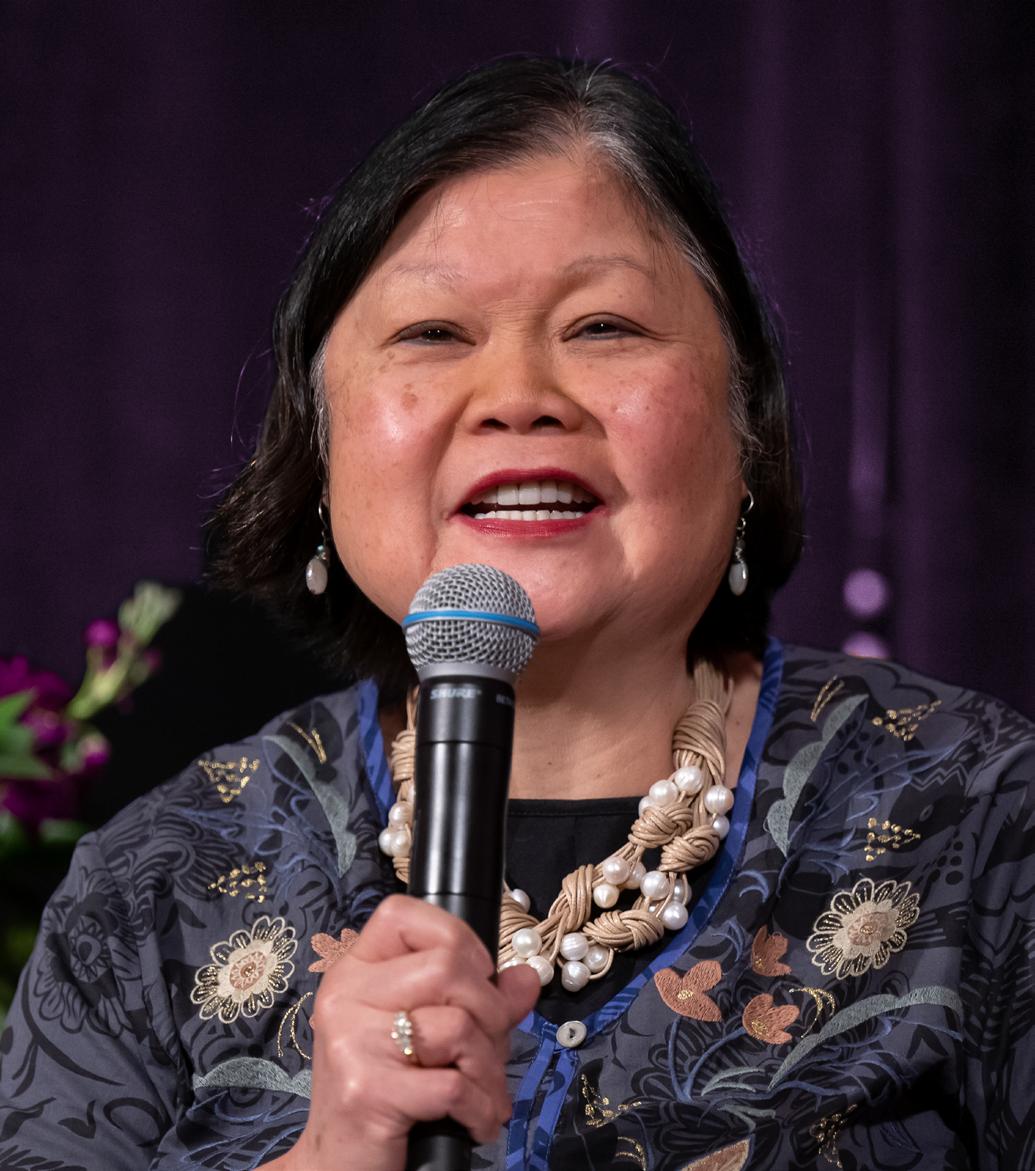
“Is it a desert? Or is it a desert with an occasional oasis?” Woo asked, reframing the question metaphorically. “Or are we really seeing the greening of the landscape?”
“Not to mention that you have Chancellors, Chief Operating Officers, Chief Strategy Officers, CFOs [Chief Finance Officers], and Chief Legal Officers in dioceses,” Woo said, adding that many of those jobs are often held by women.
Catholic universities led by women
33% Catholic Charities led by women
33%
50% Catholic health systems led by women
50% Catholic school systems led by women superintendents
Many Catholics have questioned how differently the Church might have operated in the last few decades if women held more leadership roles, particularly when questioning the response to the crises of abuse, leadership failure, and financial mismanagement.
McChesney was tasked with leading the Secretariat of Child and Youth Protection when it was created in 2002 at the USCCB. But when she took the job, she learned that women had already been working beyond their roles within the bishops' conference and across the Church to address the crisis.

When the details of abuse began to emerge in the Boston Globe, the bishops sought guidance and support from women, McChesney said. It was two women in particular Sr. Lourdes Sheehan, RSM, associate general secretary at the USCCB, and Sr. Andree Fries, CPPS, who led the USCCB’s National Religious Retirement Office who advised the bishops.
“Unbeknownst to many people, then-Bishop Wilton Gregory, who was president of the Conference, and Msgr. William Fay, who was general secretary, were in need of some backroom guidance, if you will, with regard to the crisis,” McChesney shared. “In the lead-up to the development of the Charter [for the Protection of Children and Young People], Sr. Andree who had a full-time job and Sr. Lourdes who had a full-time job began devoting time, talent, information, advice, and guidance.”
spotlight to address the crisis. Throughout the Church, women were intervening to protect children and report the offender, sometimes at great risk of their employment.
“There are hundreds of cases that you’ll never hear about of women who worked in Catholic schools and churches, who had the wonderful intuition about things that weren’t right,” McChesney said.
However, as McChesney pointed out, the responsibility of protecting children truly belongs to all members of the Church and, when all are involved, is an example of synodality in action.
McChesney also made clear that much of what inhibits women’s leadership is culture.
Srs. Andree and Lourdes advised and helped to implement portions of the Charter that, 20 years later, are still in use today legacy programs for abuse awareness, prevention, and response. But they weren’t the only ones.
But they weren’t the only women working out of the
“We have to be open to understanding our organizations, understanding organizational behavior, and then trying to find ways to make that culture change,” she said. “And cultural change is huge.”
During the plenary portion of the session, a bishop asked how to address, among seminarians, a growing and very real overlap of misogyny — the dislike and contempt of, and ingrained prejudice against women — and clericalism — an expectation, leading to abuses of power, that ordained ministers are better than, and should be over, everyone else among the People of God. He further asked how to instead create an environment where women are celebrated and incorporated into ministry.
“I don’t have enough time,” quipped McChesney in response, before stating that misogyny has no place in the Church. She suggested numerous avenues to including women in seminary formation as a means to address the problem — from hiring more women as instructors to women serving on review and psychological evaluation panels.
She noted, however, that the burden of breaking the culture of misogyny and clericalism should not fall exclusively on the shoulders of women.
“It's selecting the right individuals,” she said of the priesthood. “And when I'm asked — and I’m asked a lot about formation and yes formation is critically important — but I submit to you that selection is more important than formation.”
Woo advised that good leadership, co-responsible leadership, requires knowing how your actions impact others.
“That whole ability to really understand how you are in relationship to others and how your speech, and your behavior and your decisions, affect the other person, I think that's key,” she said.
Sr. Maya warned that not addressing misogyny and clericalism now could lead to an even more hurt Church in the future.
“I just worry, I truly worry, that if we don't take some of those lessons, in 10 or 15 years, we're going to start to see those lawsuits and an even more hurt Church,” she said. “We can't do that anymore.”
Despite the stories emerging of the historic presence of women’s leadership in the Church, and the growing number of women in leadership roles, Woo said she has recently been part of events that, for merely featuring a few female leaders, were billed as “historical” and where there was a policy that the group wouldn’t do interviews unless there were other women panelists.
Sr. Maya said she has often been the only woman at the table or serving on the board of directors.

“And I just said, ‘I'm here for everyone else that hasn't been invited,’” she said.
Casey Stanton, co-director of Discerning Deacons, said her organization formed in 2021 by listening to the stories of women, by encountering women and trusting their experiences.
In considering how to frame her comments during the Summit and share what she has heard from women, Stanton noted the need for vulnerability in synodality.
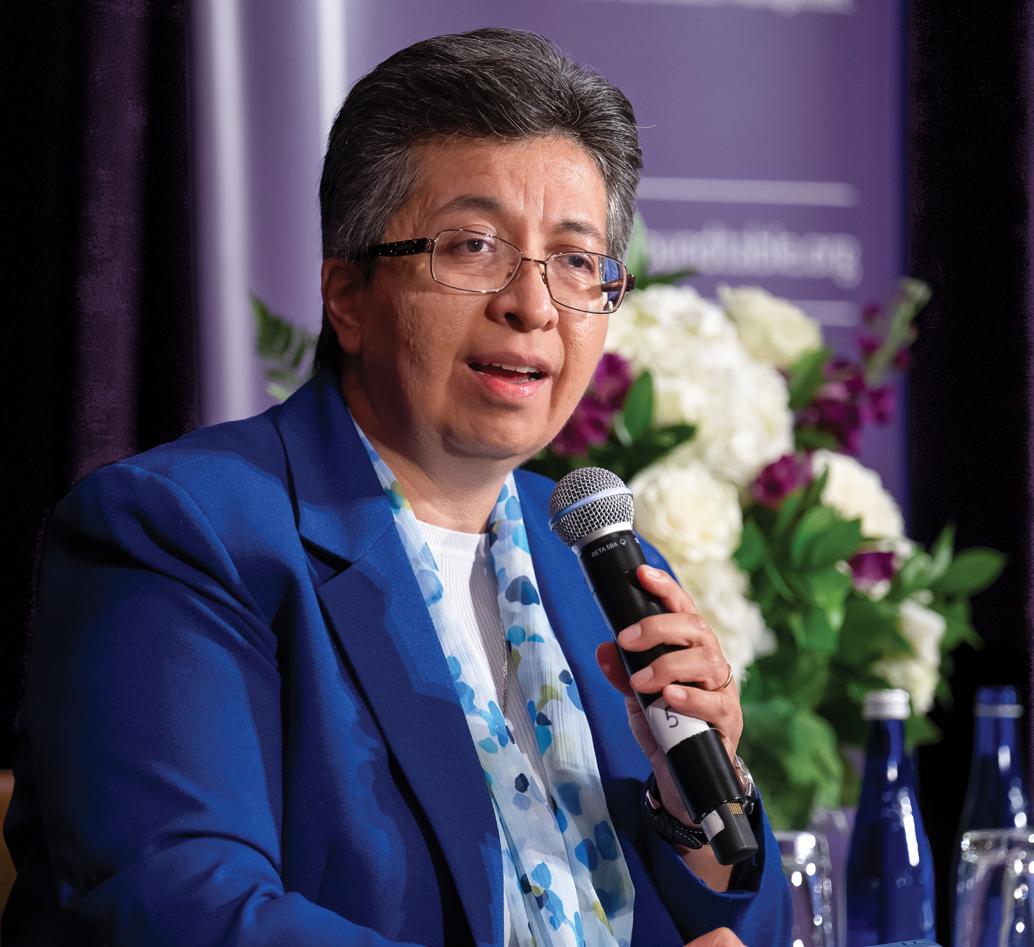
“And just as it's true that there's no synodality without the Holy Spirit, there's also no synodality without vulnerability,” she said. “The gift of tears comes because I’m so filled with their broken hearts, and their deep, deep love of this Church.”
Many women feel caught in the intersections between their vocational call and a profound love of Jesus and the Gospel, a profound love of the Church, and a profound love of the people they feel called to serve.
“And there’s a real heartache in that, that women carry,” she said. “And they often don’t speak it aloud.”
Acknowledging that her organization deals with the very difficult question of women and if they should be allowed ordination to the diaconate — a Holy order that, in the past, was opened to women as well as men — Stanton encouraged those who felt their “hackles” going up to take a deep breath.
“We’re not doing anything heretical,” she said. “It’s OK for us to talk about the question of women in the diaconate.” During his papacy, Pope Francis has created two commissions, including a current one in 2020, to study the history and question of women deacons.
She encouraged those in the room to not miss the moment, not miss the opportunity presented in the Synod process to discern what is being revealed by the Holy Spirit in regard to women’s leadership.
“What would that mean in your own backyard? Who would it be good news for?” she asked. “And as you go out and listen to your daily communicants, to your folks who work right next to you in the diocesan office, to those who have one or maybe two feet out the door, old and young, is you just hold a space to live this question together and listen for what's revealed.”
“I think there's perhaps more that the Church could do to fully receive the gifts of women for ministry,” Stanton said.
The USCCB’s Synod synthesis report and those released by other countries have made clear that the People of God desire to see more women in leadership roles, even as they also acknowledge that women are currently serving in many roles throughout the Church.
“We're all invited to make the road by walking it together,” Stanton said. “We are diminished when
any of us feel like we can't put forth the gifts that are here that we want to offer to the collective project of building the kingdom of God and building up the body of Christ.”
“At every level, we need a succession plan for ongoing leadership, and encouraging and welcoming in those gifts,” Sr. Maya said. “And this, this will be an incredible Church if we do that.”
Woven throughout all the stories shared by the panel, there was a thread of courage, noted moderator Alexandra Carroll, Communications Manager for Social Mission with the Department of Justice, Peace and Human Development at the USCCB.
“We see time and time again, women are coming to the top of leadership. They’re acting courageously,” Carroll said. “We women have continually led with this courage and by embracing new strategies, embracing these folks on the margins. What can the Church learn from this experience?”
It is important to realize that not all women start with courage, some started with simply caring about something and found the Church a place where they could live out their call to action, Woo said.
Teaching children to care, creating space in the Church to mentor and recognize a person’s gifts, and then making sure they know the Church is a place where they can put their call into action are vital first steps, she said.
Sr. Maya cautioned that the efforts to include women in leadership need to be intentional, it won’t happen organically.
“It's not about creating policies, but we need a pathway,” she said. “I think we need to start with girls and teenagers. They need to know that this is their Church. They need to feel encouraged. We need pathways to leadership in every area of our Church life, whether it's liturgy, social services, Catholic organizations.”
Expanding women’s leadership also isn’t as simple as “add a woman and stir,” or change one word in canon law and we’re fixed, Stanton said. “No, it's much deeper than that.”
Conversations, listening, and discerning together are the mold into which Pope Francis is leading the Church for decisions about leadership and more.
“A much more charismatic discernment of a leadership flowing out of gifts for the position — this is the reform of the Curia that we are witnessing right now,” Stanton said.
Women’s leadership also must include recognizing the dignity of women, Sr. Maya said.
“We have to defend women, protect women, help women. We have to be fierce about our care for women,” she said. “I hope that if we do this, as a community, I will one day be able to answer that question my friend asked in college so many years ago.”
I think there's perhaps more that the Church could do to fully receive the gifts of women for ministry.
–CASEY STANTON
The Church needs to create and implement human resources policies that better reflect the role of women in our Church and society.
• Build hiring practices, create leadership roles, and offer mentoring opportunities directly for women in parishes, dioceses, and Catholic organizations.
• Actively recruit women for leadership positions, pastoral and finance councils (parish level), boards of directors and trustees, and executive positions.
• Publicly share pay ranges and benefits when positions are posted at the time of hiring.
• Review employee compensation to identify disparities and, where present, address by offering pay and benefit increases to ensure parity among employees.
• Use succession planning as an opportunity to advance women into positions of leadership at various levels of the organization, parish, or diocese.
• Adopt a generous, paid parental leave policy for those parents of a newly born, adopted, or fostered child, with a goal of at least 12 weeks, when possible.
• Provide paid leadership formation for women in leadership roles, similar to what is offered in seminarian and diaconate formation.
• Prioritize investment in women’s leadership formation similar to how the Church invests in seminarian and diaconate formation.
There is a strong desire among the People of God for women to serve in greater leadership capacities within the Church, but there are still structural and cultural barriers that need to be addressed.
• Review existing leadership structures to identify strategic decision-making roles traditionally held by men that could be opened to women.
• Work to restructure at the local level, including considering revising job titles or creating new positions that allow more access to senior leadership for women, such as a Chief of Staff, or Chief Operating Officer.
• Create and promote pathways for women to participate in Church governance and pastoral care as well as administrative roles.
• Identify, open up, and welcome leadership positions in the Church that are outside of priestly ordination. Ensure women and lay leaders present at all decision-making tables of parishes, dioceses, and Catholic organizations.
• Review pastoral plans to specifically ask who is not represented or is prevented from serving in leadership.
• Set a minimum standard of how many women serve on councils, boards, and committees.
Transparency regarding how many women serve in Church leadership and the roles that are open to women are vital for building a co-responsible culture.
• Recognize the many women who are currently serving in leadership in the Church and Catholic organizations, and share data on their impact.
• Affirm and promote the number of women currently in leadership and the importance and benefit of women in leadership roles.
• Publicly highlight the contributions women are making in the governance and decision-making of the Church.
• Prioritize transparency in leadership by offering materials that can educate members of a faith community on Church teachings regarding women and the laity in leadership.
• Share the names and roles of all leaders on parish, diocesan, and organizational websites.
• Publish an annual report that shares the work of parishes, dioceses, and Catholic organizations and includes data for how many leaders are women, laity, clergy, etc.
• Regularly share stories of the women and lay leaders serving in parishes, dioceses, and Catholic organizations through channels of communication.
• Engage in the current discernment process of our Church, initiated by Pope Francis, surrounding women in the diaconate.
• Actively include women in liturgical roles, including speaking and reflecting during Mass and serving as lectors and Eucharistic ministers.
• Diversify the public voices who speak on behalf of the parish, diocese, or Catholic organization to include more women.
• Be intentional about tracking who is speaking on behalf of the parish, diocese, or organization to ensure that there is balance among the voices, paying particular attention to including women.
To shift the leadership culture of the Church toward greater co-responsibility, the presence of women in leadership roles within seminaries and within the early and ongoing formation of clergy is critical.
• Intentionally and actively include women in governance, teaching, and formation at seminaries for ministers (including priests) and ministries working to influence the current clerical structure and culture in the Church.
• Set benchmarks, goals, and procedures to recruit and retain women as formators and instructors in seminaries.
• Ensure women are part of the governing body that determines curriculum and pastoral experience, spiritual formation, and moral development at seminaries.
• Involve women in the training and formation of new leaders, including ordained leaders, as a best practice to help build a new culture of leadership in the Church.
• Involve women in the decision-making process of whether a seminarian is fit for ordination.
• Establish an ordination requirement that includes evaluating the ability of candidates for priesthood to interact and collaborate with women on a professional level as equals.
• Establish an early and ongoing formation process for clergy that directly involves women.
• Incorporate women’s history in the Church into core seminary curriculum.
• Explore avenues for women in the local faith community to serve as mentors and advisors to seminarians during their formation and education.
• Require that seminarians are interacting with lay ecclesial ministers during their pastoral assignments.
• Develop a process for seminarians to receive feedback on their homilies from a group of laity that especially includes women.
Women face unique challenges as leaders in the Church and often are the only woman at the table. Promoting women’s leadership requires also providing peer support, community, and means of connection for those who take on leadership.
• Acknowledge and be responsive to the unique challenges women face as leaders in the Church.
• Create and support spaces that offer women leaders connection, advancement, leadership development, access, counsel, information sharing, and community.
• Prioritize the mental and spiritual health of women leaders by offering access to ongoing formation and support both inside and outside of the Church.
• Provide specific opportunities for women leaders to gather and network at diocesan and national forums.
• Commit to a wider adoption of a Catholic women's theological initiative to foster pathways including mentorship, community action, intentional spaces, scholarships, strategies, resources, and a clear invitation to the table for women theologians.
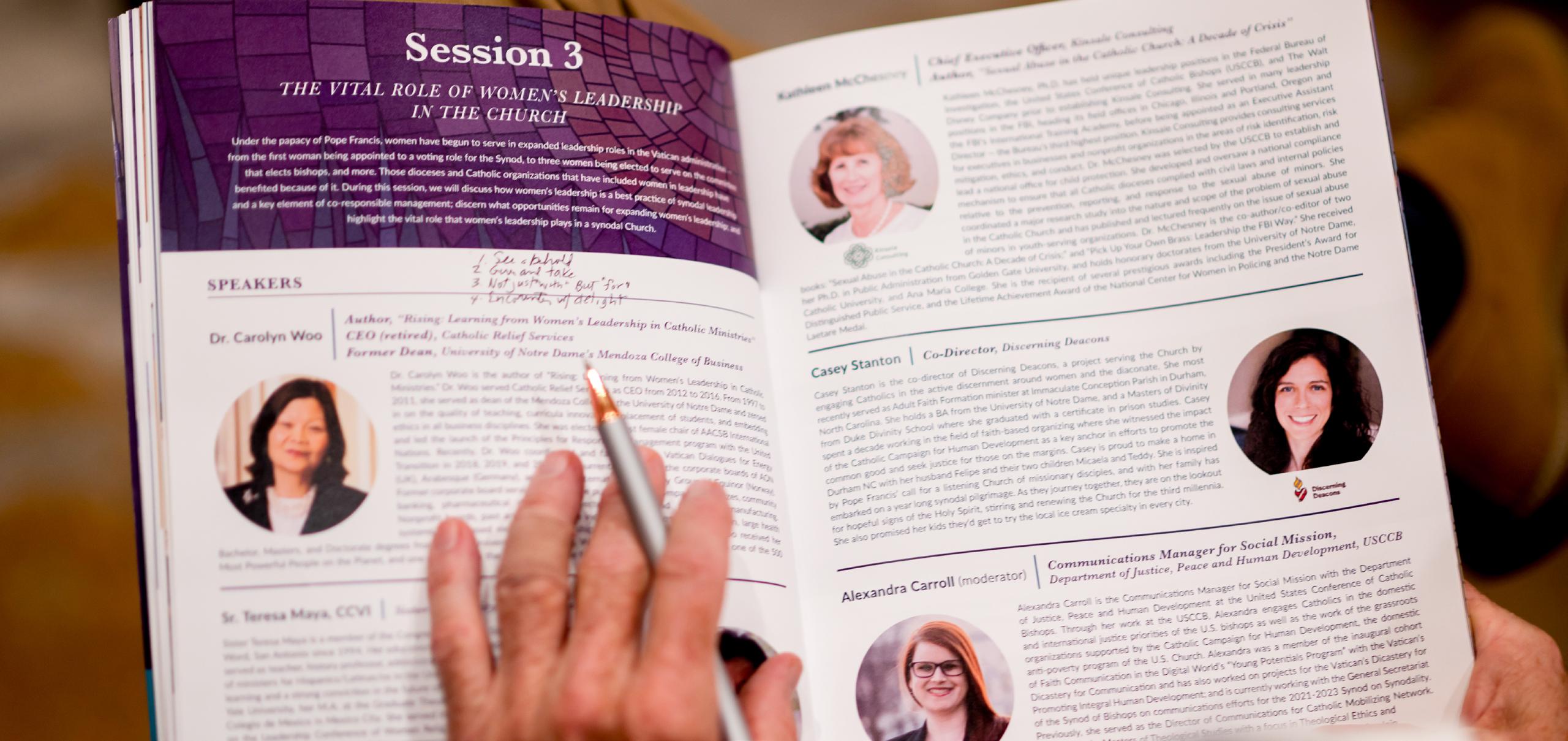
Starting from the Periphery
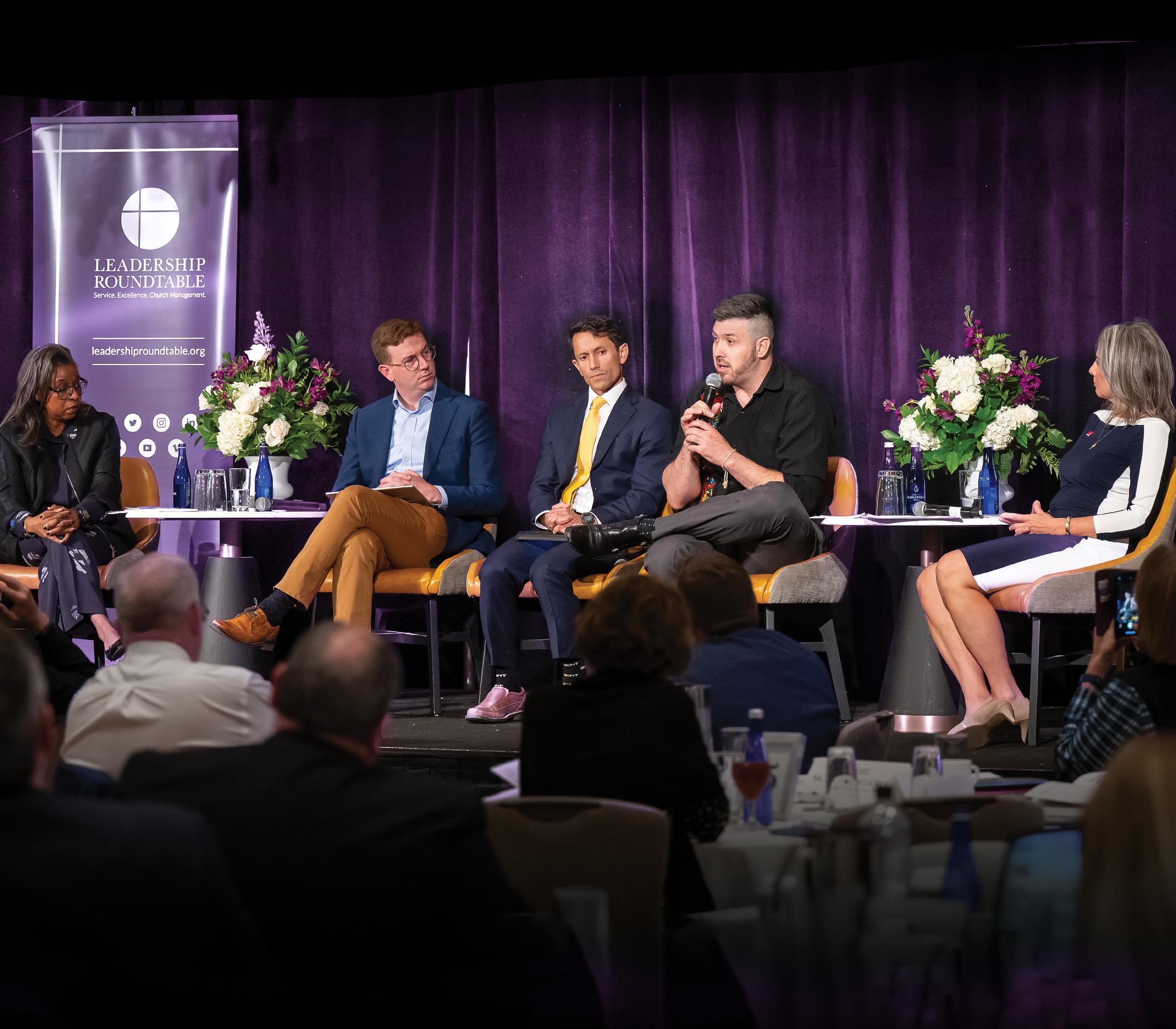
The importance of listening and its transformative power were common threads woven throughout the Catholic Partnership Summit. Each thread led participants to the final panel, where leaders considered Emerging Models of Leadership and Faith in Practice and how being responsive to the Holy Spirit and the needs of the Church is already building a synodal Church.
Led by moderator British Robinson, panelists Krisanne Vaillancourt Murphy, John Cannon, Bruno Spriet, Vicente Del Real, each shared their organization’s unique work within the Church and how it affirms, furthers, and supports the synodal way of being Church.
When the Catholic Church began its synodal journey in 2021, those who minister through restorative justice started hearing their long-used vernacular becoming more mainstream.
Within months, the global Church was talking about encountering one another and engaging in listening and discerning together, even with those outside of the Church.
“Synodality speaks about listening, encountering, and discerning, and we recognize these as restorative practices,” said Murphy, executive director of Catholic Mobilizing Network an organization that seeks to promote restorative justice practices in the Church. Restorative practices utilize an approach where crime
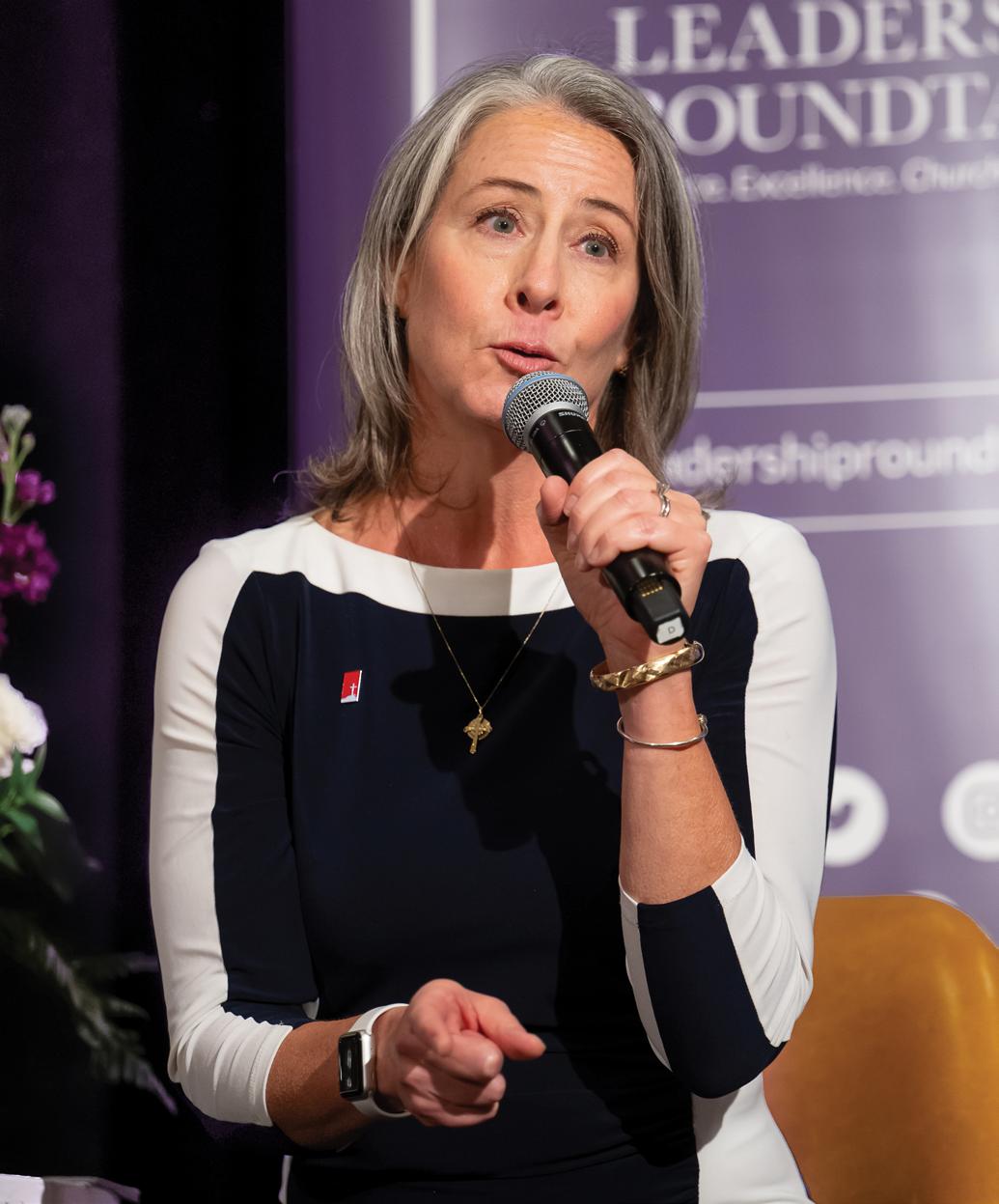
and harm are understood in terms of the people and relationships impacted, rather than solely the law or rule that was broken, Murphy explained. It seeks to repair harm through transformative encounters that model Jesus’ reconciling way.
The United States Conference of Catholic Bishops’ (USCCB) synthesis of the synodal conversations held in the U.S. revealed many wounds are still deeply affecting the body of Christ from the sex abuse crisis to the polarization and marginalization of many Catholics. For those not steeped in the work of restorative justice, its approach can seem radical justice found through victims and perpetrators actively encountering, listening
Krisanne Valliancourt MurphySynodality speaks about listening, encountering, and discerning, and we recognize these as restorative practices.”
–KRISANNE VAILLANCOURT MURPHY
to one another, and discerning collectively to repair the relationship that was harmed.
“Each of these areas, though, need certain capacitybuilding in our Church because frankly, these ideas are radical in our culture today, in our culture that's about dehumanizing, about othering, about canceling,” Murphy said. “So the fact that we draw people closer to listen, to truly encounter, and then to discern — it's a different way of being.”
Listening, encounter, and discernment are not only common elements of restorative justice and synodality, they are antithetical to the division prevalent today, Murphy shared.
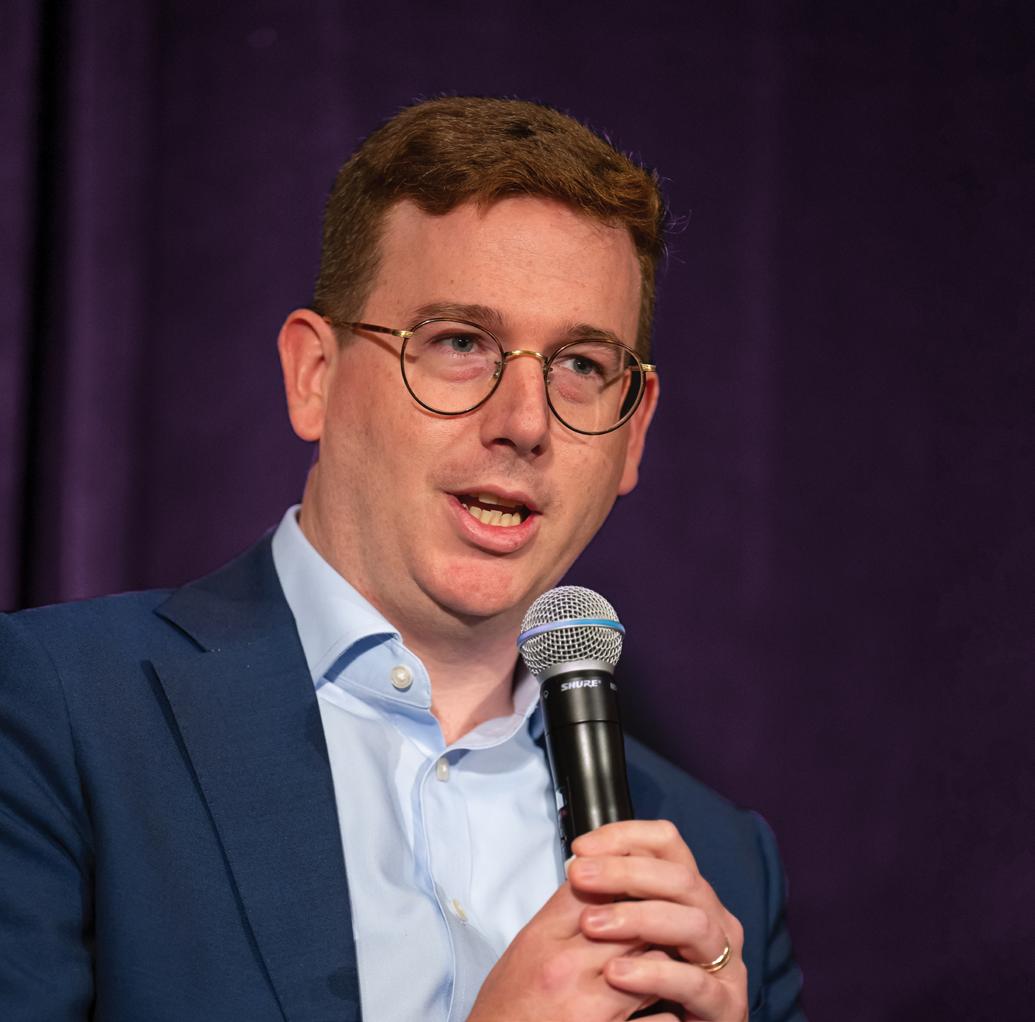
When it comes to utilizing emerging models of leadership and putting faith into practice, Vicente Del Real who founded the ministry Iskali to serve young Latino adults by providing faith formation, leadership development, and mentoring encouraged leaders to lean into listening as a critical first step.
“Listen to your people,” Del Real said. “You know, the
answer is right in front of us. We just need to listen to them and serve them. The Church must serve the people that are in front of them.”
Del Real founded Iskali to meet the needs he continually encountered in the young adult Latino community of the greater Chicago area.
In the United States, nearly half of practicing Catholics identify as Hispanic or Latino. Yet only about 3 percent of ordained ministers and only 10 percent of lay leaders are Latino. Latino young adults face particularly difficult challenges and struggles with their faith, del Real shared.
“And so you have to be confronted with this question and say, ‘What is God calling me to do here?’” Del Real said. He challenged those in attendance to further consider: “What is God calling you to do here?”
A recent Iskali retreat revealed that about 40 percent of young adult Latinos have attempted to end their own life, del Real shared. In addition to mental health, many young adult Latinos also struggle with addiction, and the barriers they face to education and earning living wages have led to only 17 percent of low-income Latinos who enter college actually graduating.
For del Real, he said he felt the Holy Spirit calling him to do something.
So Iskali began providing a scholarship for students to help them get their degree. To address the community’s struggles with addiction and mental health, Iskali began hosting retreats, and now 80 percent of those who attend a retreat will leave an addiction, he said.
When confronted with the community’s struggle with health, Iskali began offering after-school sports for a small fee to both promote physical activity and to Bruno
engage the young adults in a community.
“We cannot wait for nobody to resolve this for us,” he said. “We need to do it ourselves.”
Pope Francis called on the global Church, as part of the Synodal journey, to listen to as many Catholics as possible about their experiences, particularly those who have been marginalized by the Church.
Throughout the 2022 Catholic Partnership Summit, leaders returned to the question of who was missing from the conversation, who was missing from the leadership tables. Moderator British Robinson, a member of Leadership Roundtable's Board of Directors, asked the panel to consider who was missing from the leadership tables in their communities.
Del Real said young adults in particular are left on the sidelines and excluded from leadership.

“From Genesis, you see that God has a preferential option for young people,” he said. “Mary herself was a teenager. Jesus was a young adult. And that is not reflected in the Church. We need young people leading.”
Bruno Spriet, global programme manager for Porticus, shared that when it comes to synodality and synodal leadership, there is another group missing from the conversations: those who fear or are skeptical of the process.
“I think there's a tendency to unconsciously exclude those people,” Spriet explained. “It's important to invite them to the table and to let them talk about their fears and their criticisms of the process. Because if we don't understand and give those fears and concerns a place, you'll not be able to find a response to welcome them and to deal with it.”
Many people still have doubts and issues with synodality, Spriet noted.
“We think ‘where is this going? Is it going to work?” he said. “It’s requiring a mentality shift in the Church. It requires new policies, new ways of working.”
There are many people in the Church who are actively working to live synodaly and put synodality into practice, Spriet said.
John Cannon, founder of SENT Ventures, discerned in his time in Carmelite formation that he needed to leverage his early career in finance and business to create a ministry that supports those seeking to live out their faith and serve those around them.
Throughout Church history, there are examples of leaders who identified needs around them and answered the call of the Holy Spirit to find a way to meet those needs including Mother Teresa who founded a new religious order out of her work to serve the poor on the streets of Calcutta, Cannon said.
Leaders like Mother Teresa are in their own way entrepreneurs, he explained, and there are many in the Church today seeking support and creative ways to meet the needs of others in their communities.
And while there are massive ecosystems that support entrepreneurial leaders in other sectors, Cannon said very little support exists for those seeking to minister in innovative ways in a faith context.

That is where SENT Ventures comes in. Cannon said SENT Ventures seeks to fuel Catholic entrepreneurs to address pressing human and spiritual needs through integration of world-class business insight and deep spiritual practice.
“I begin thinking, well, who are entrepreneurial leaders today? Who are addressing needs in the world, but bringing God into it, bringing the Holy Spirit into that work? And how can they be supported?” Cannon said.
To date, SENT Ventures has worked with hundreds of faith-based entrepreneurs to support their work and their spiritual formation.
“The leaders we work with are hungry for more spiritual integration in their life,” he said. “People, I think, are hungry for spiritual formation. A lot of us didn't get it growing up or we didn't get enough of it.” Among the leaders who come to SENT Ventures for support, Cannon said there is a need for mentorship that is both grounded in their field and in their faith.
Often the work to build emerging leadership models, meet community needs, or bring faith into greater practice occurs outside the structures of the Church, Robinson noted. Iskali, Catholic Mobilizing Network, Porticus, and SENT Ventures all work outside the traditional structures of the Church to bring individuals, who find themselves on the outside, into deeper faith and greater communion as members of the body of Christ. Robinson encouraged leaders and Leadership Roundtable to consider other ways to partner with universities, schools, and others to
help acculturate emerging leadership models into the structures of the Church.
Murphy shared that restorative practices, in particular, often have to be more subversive, exposing people in small ways until they begin to see through their own experience that something is different.
Cannon encouraged leaders to find hope in the fact that many faith movements begin on the margins and not let it discourage them from offering their support. Even Jesus began his ministry from the periphery, outside the Jewish structures at the time, he noted.
“It often is how the Holy Spirit has worked historically in the Church,” he said. “New movements in the Church that are fruitful, often happen in the charismatic, happen outside of the traditional structures of the Church — whether it's the birth of the Franciscans, the monastic movement, or Mother Teresa, you know, starting by herself with a habit on the streets of Calcutta.”
Leaders who receive feedback are stronger and better equipped to lead.
• Ensure that all parishes and dioceses have active advisory councils, including finance councils.
• Ensure that all senior leaders and council members systematically receive feedback from parishioners so that accountability and inclusion of diverse perspectives is a hallmark of their approach to leadership.
• Construct a communications network for best practices in pastoral leadership, i.e. a forum for sharing and receiving insights for creative pastoral practice for parishioners to give feedback as to how their pastor and pastoral staff is working within their community.
• Prioritize ongoing enculturation formation to all priests serving in the United States — beginning in seminary — specifically in relationships with lay leaders, women, and people of ethnic and racial backgrounds different from their own.
• Create an avenue for parishioners, diocesan officials, priests, etc. to provide seminaries with feedback on clergy who are in their first few years of parish life.
Leadership structures cannot remain as they are if the Church is to continue to heal, strengthen and thrive. Rather, it must adapt to be transparent and responsive while still meeting the needs of those the Church serves.
• Explore methods of shared governance utilized in other sectors and evaluate what could be applied to Church leadership structures.
• Learn from different models of parish governance that include a priest-moderator and lay professionals working in partnership.
• Pay living wages to employees of parishes, dioceses, and Catholic organizations, and hire people with competency in what they are employed to do.
• Clarify the scope of authority of senior leaders in parishes, dioceses, and Catholic organizations.
• Facilitate regular contact between those in leadership and the broader stakeholder community, and encourage leaders to seek counsel, input, and guidance from those who they work with and serve.
• Ensure decision-making bodies that advise bishops include individuals with expertise in governance and management.
• Align and communicate clearly the purpose of diocesan offices to serve parishes and ministries, and ensure transparency and responsiveness in this primary mission.
Young adults, Hispanics/Latinos, and people of color have been historically excluded from leadership. The Synodal process has presented the opportunity for the Church to invest in and include these communities going forward.
• Provide multiple ways for young adults, Hispanics/Latinos, and people of color to connect with parishes through social, recreational, and service events in addition to liturgy and worship opportunities.
• Actively welcome young adults, Hispanics/Latinos, and people of color to parishes and encourage them to welcome others.
• Create mentoring and leadership training programs for young adults to transition into leadership roles.
• Create and promote programs and opportunities at Catholic institutions of higher learning that provide pathways to education for Hispanic/Latinos and other young people of color.
• Revise policies to actively include positions for young adults on advisory and governance councils of Catholic organizations, dioceses, and parishes.
A key part of the Synodal process involves openness and commitment to expanded and innovative methods of leadership, governance, outreach, and evangelization in the Church. Encouraging and supporting innovation is part of how the Church will remain relevant and agile in carrying out its mission.
• Foster a culture that is open to new ideas by supporting new initiatives with leadership and funding.
• Invest in leadership capacity assessment for lay and clergy leaders of parishes and dioceses that includes personalized ongoing formation and leadership development.
• Create platforms for innovators in ministry and the apostolate to meet, inform, and support each other.
• Conduct periodic analyses and listening exercises to understand the emerging needs of the institution.
• Provide resources (budget and personnel) to support innovative methods of evangelization, communication, and formation.
• Create space at the parish level to encourage and support innovation, welcoming those with new ideas and perspectives, along with a budget for pilot implementation.
• Be open to change, disruption of the status quo, failure, and discomfort as part of the process of innovation.
• Identify what fuels innovation within parishes, dioceses, and Catholic organizations and work to eliminate barriers so that creativity can flourish.
• Develop methods to ensure a broad range of voices contribute ideas as part of the decision-making process.
• Provide structured mentorship to leaders with a goal to create space to foster growth, creativity, and innovation.
• Integrate innovation, skill-building, and change management into leadership formation.
Institutions of the Church must uphold and respect the inherent dignity of each member of the body of Christ who are impacted by its decisions and structures.
• Form leaders in restorative justice practices and cultural competency.

• Recognize the human dignity of all the people involved in or affected by decisions.
• Prioritize mental health and work to destigmatize mental health concerns by providing access to mental health services for all staff.
• Practice empathy in leadership and pastoral relationships by actively listening and facilitating conversations that respect dignity, value vulnerability, and encourage openness.
• Review the operations of your institution and ask if any practices limit or discourage individuals or communities from actively taking part and what steps can be taken to foster more inclusion.
• Consider changing meeting times; offering child care or programming simultaneously with other meetings; offering accommodations to those with special needs such as vision impairment or food reactivity; and updating facilities to ensure safe access for those with differing abilities.
• Promote and support intentional Catholic communities and welcome their role in your parish, diocese, or Catholic institution.
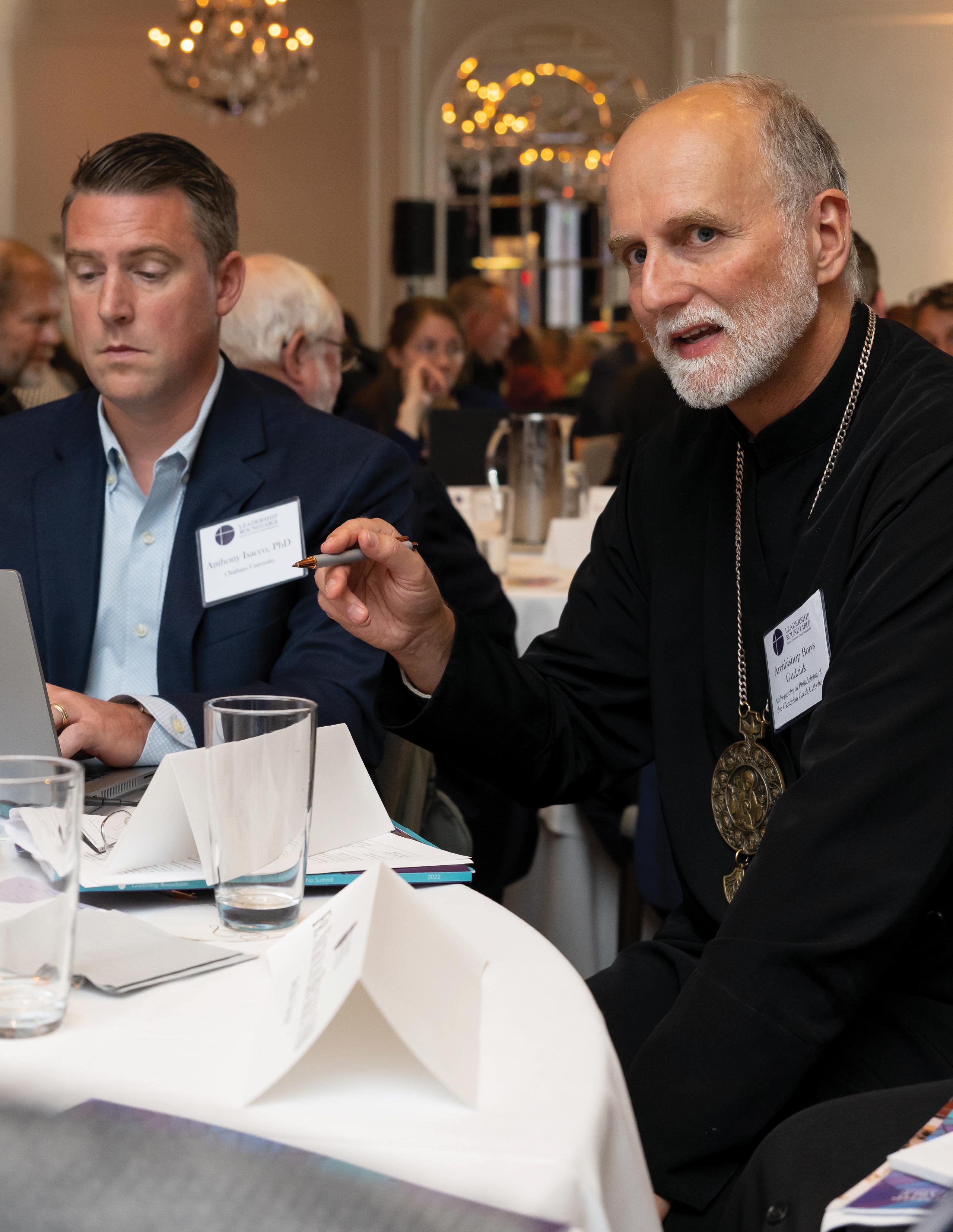
At the end of the 2022 Catholic Partnership Summit, Leadership Roundtable shared the organization’s preliminary commitments in response to what had transpired during the convening:
1 Continue to aid the Synodal process globally and in the U.S.
2 Collaboratively create a new synodal leadership formation program
3 Continue to regularly convene national Catholic leaders in support of their synodal leadership
4 Discern our role going forward promoting dialogue around conflict resilience
5 Actively seek out more women, young adults, and people of color as members of Leadership Roundtable’s board and staff
6 Expand the work of the Coalition for Ethical Financial Management in the Church
7 Expand leadership formation for Hispanic/Latino leaders
8 Produce Spanish-language resources and services.



In 2022 following the Catholic Partnership Summit, Leadership Roundtable partnered with four leading Catholic organizations to develop a Synodal Leadership Formation program. An outgrowth of the Pope Francis call to synodality, the program aligns closely with the values our organization has held since our inception and focuses heavily on co-responsibility — lay, religious, and clergy working together as leaders.
Since the Summit, leaders from each of the four organizations have met in person to both learn how to work synodaly as unique and independent institutions and to further develop the program.
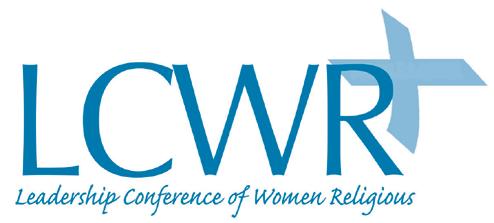
The program is set to pilot in the Spring of 2023 and Leadership Roundtable looks to share more about the program in the year to come.
Our Synodal Leadership Formation Partners are:
 Front (left to right): Fr. David McCallum, SJ, Kim Smolik, Joanne Ruddy. Middle (left to right): Dan Cellucci, Sr. Carol Zinn, SSJ, Carlos De La Rosa, Fr. Kevin Kennedy. Back (left to right): Pablo Bernal, Christine Bodewes, Sr. Susan Francois, CSJP, Michael Brough, Sr. Anna Marie Reha, SSND
Front (left to right): Fr. David McCallum, SJ, Kim Smolik, Joanne Ruddy. Middle (left to right): Dan Cellucci, Sr. Carol Zinn, SSJ, Carlos De La Rosa, Fr. Kevin Kennedy. Back (left to right): Pablo Bernal, Christine Bodewes, Sr. Susan Francois, CSJP, Michael Brough, Sr. Anna Marie Reha, SSND
Leadership Roundtable is inspired by Pope Francis’ vision for the global Church and his call for all Catholics to engage in a synodal journey. Drawing upon a long-standing working relationship with many Vatican dicasteries, including the Secretariat of the Synod of Bishops, and the United States Conference of Catholic Bishops (USCCB), we endeavored to help dioceses and Catholic organizations implement the Synod process.
For dioceses, we produced and shared two documents throughout the United States and the world to assist in Synod consultations:
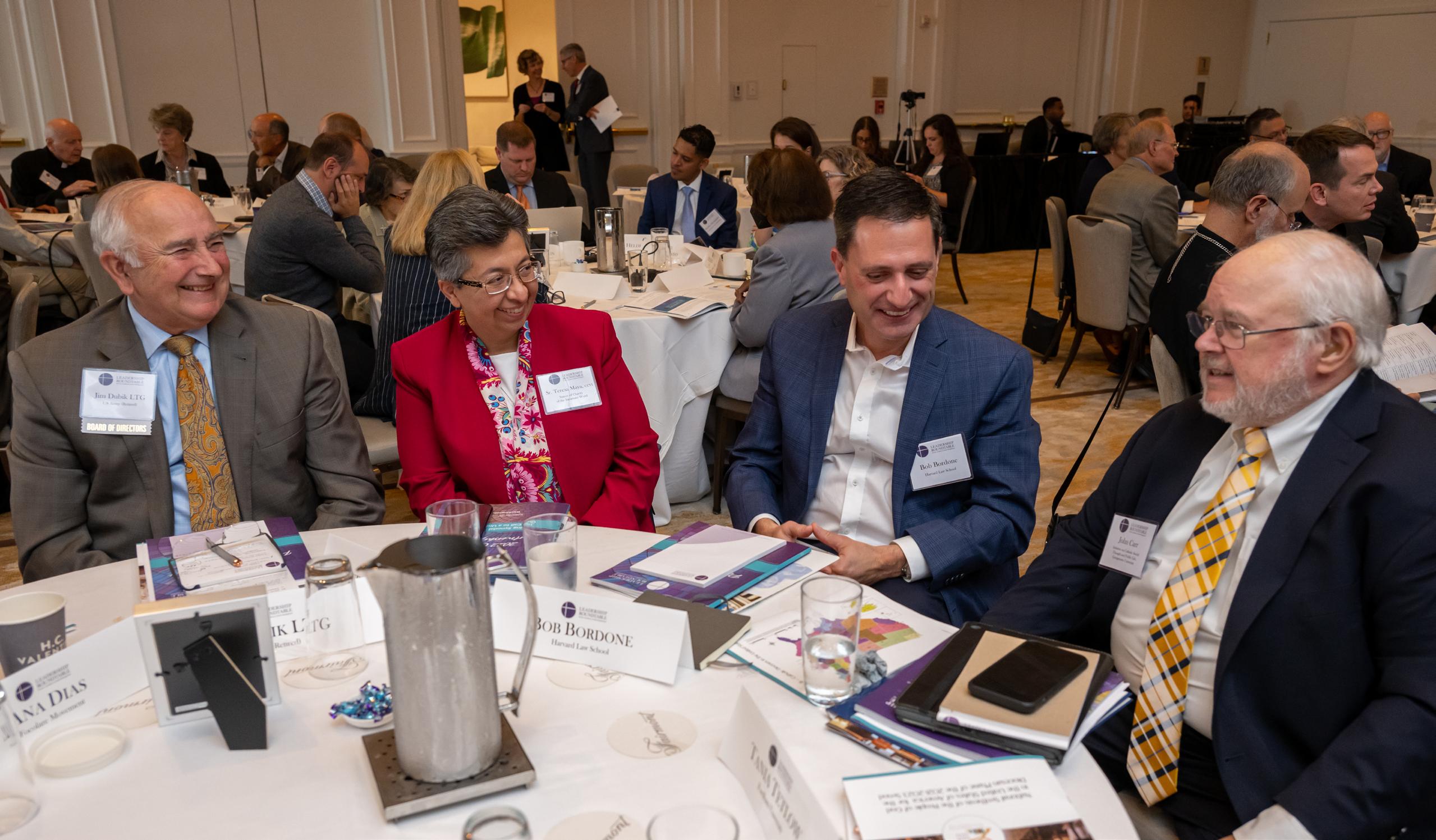
• A guide for Facilitating Synodal Consultations, available in English and Spanish
• A guide for Reporting Synodal Consultations, available in English and Spanish.
Additionally, we convened leaders from national Catholic organizations, movements, and institutions in three consultations to engage them in the Synod process.
We continue to be a collaborator with the Vatican and the USCCB in the ongoing Synod process.
Leadership Roundtable is collaborating with Catholic organizations across the U.S. to make our powerful Catholic Leadership 360 feedback assessment experience available in English and Spanish to many more Catholic leaders.

For more than 15 years, Catholic leaders have been transformed by the feedback they’ve received through our Catholic Leadership 360 program. More than 21 dioceses in the United States have participated in the Catholic Leadership 360 program, including: Austin, Baltimore, Boston, Cheyenne, Chicago, Evansville, Galveston-Houston, Indianapolis, Jefferson City, Joliet, Lafayette-in-Indiana, Lansing, Louisville, Manchester, Metuchen, Milwaukee, Newark, Owensboro, Pittsburgh, St. Augustine, and St. Paul and Minneapolis. Participants have included 630+ Catholic priests, including 14 bishops, and 400+ lay ecclesial ministers — from school principals, Hispanic/Latino leaders, and parish life directors to chancellors and pastoral associates.
We know that meaningful feedback and a personal development plan can greatly improve a person’s ability to lead more effectively and experience a greater sense of competence in pastoral ministry. That is why Leadership Roundtable is offering our custom feedback assessment experience to as many leaders as possible. We have scaled Catholic Leadership 360 so that dioceses, colleges and universities, seminaries, religious communities, Catholic organizations, schools, and other partners can now offer it to their faculty, leadership teams, students, and more.
Lilly Chhin of the Diocese of Austin. Photo Credit Ashley Valle
The Toolbox for Pastoral Management is a comprehensive program that introduces the key elements of pastoral leadership and management to priests, seminarians, and lay pastoral leaders. A residential program, the Toolbox offers a formational and education process that covers essential leadership and management topics critical to the pastoral role. Participants engage in a series of presentations that provide practical tools for the busy pastoral leader. Prayer, the sacraments, and fellowship round out this program.
Toolbox for Pastoral Management — Advanced Level is the next step for experienced pastors and pastoral leaders seeking to further sharpen their skills in ministry.
Leadership Roundtable is pleased to announce Sacred Heart Seminary and School of Theology will be hosting a national Toolbox for Pastoral Management facilitated by Leadership Roundtable for recently or soon-to-be appointed pastors/administrators throughout the U.S. This program will be held June 5-9, 2023 at the seminary in Hales Corners, WI. For more information about this event and to register, please visit www.shsst.edu/toolbox or scan the QR code.

 Participants in a Toolbox for Pastoral Management in the Archdiocese of Atlanta. Photo by Michael Alexander
Participants in a Toolbox for Pastoral Management in the Archdiocese of Atlanta. Photo by Michael Alexander
The Latino Pastoral Leaders Initiative is a comprehensive formation program that provides Hispanic/ Latino leaders access to critical leadership skills and addresses the complex pastoral environments where these leaders serve. Leadership Roundtable created the Latino Pastoral Leaders Initiative in response to the growing and unique needs of Hispanic/Latino pastoral leaders witnessed through our work with dioceses across the United States and the National V Encuentro process. It was developed thanks to generous funding from Lilly Endowment Inc. through their Thriving in Ministry Initiative.
In 2021, Leadership Roundtable launched this program working with Hispanic/Latino leaders in the Diocese of Joliet. The program expanded with a second cohort in the Diocese of St. Augustine, and grew again with a third cohort in the Diocese of Austin. The program will continue to be offered in partnership with dioceses throughout the U.S.
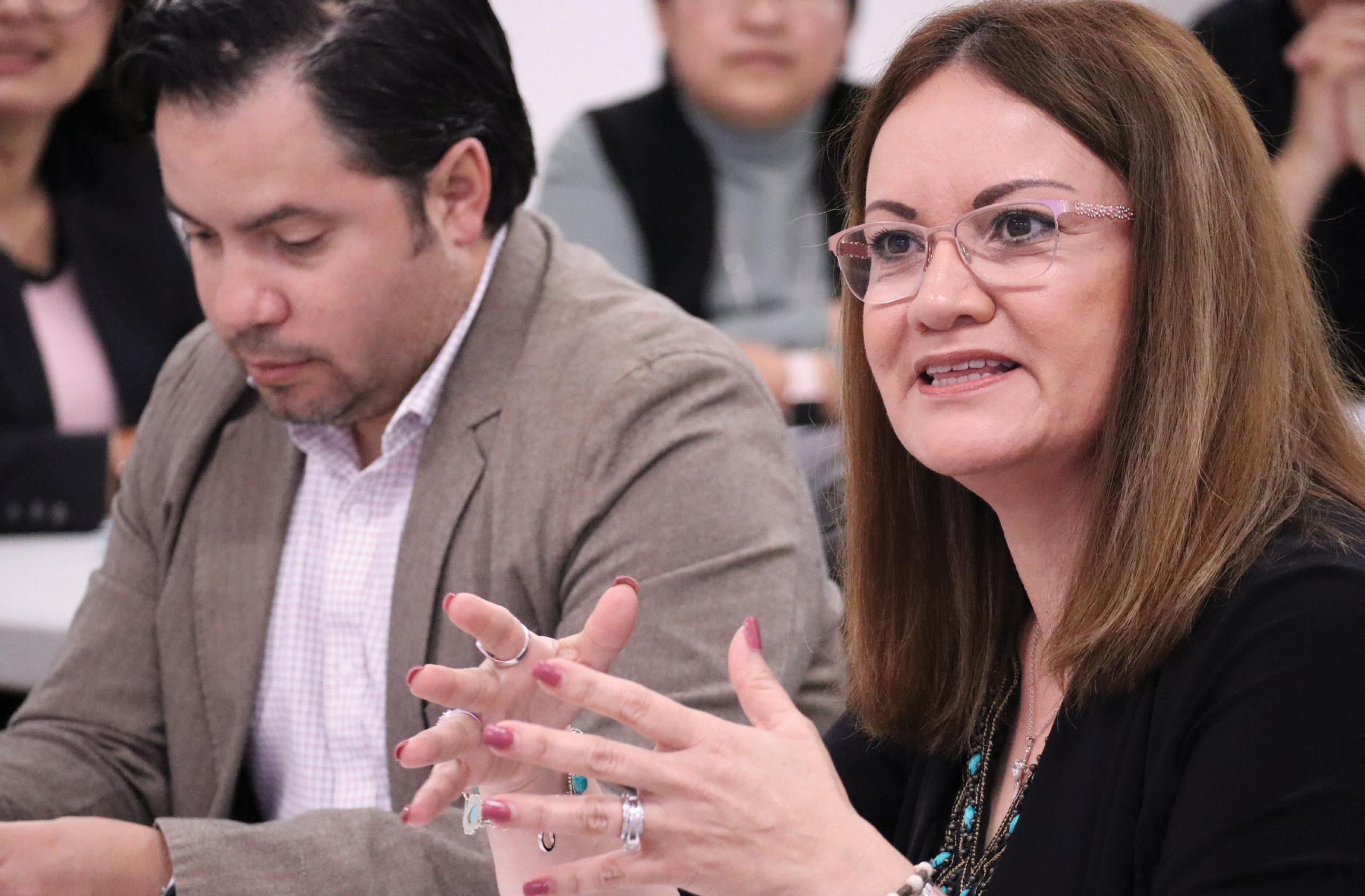
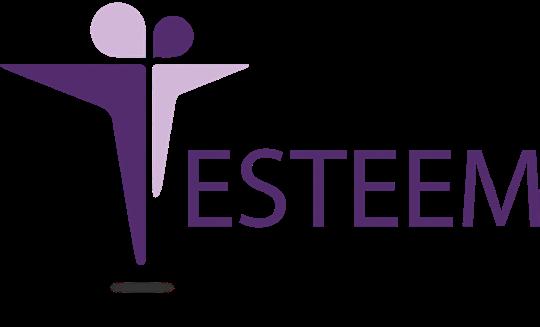
Catholic leaders must create a seat at the table of leadership and a voice in decision-making for young adults in the Church today. Leadership Roundtable is committed to promoting young adult involvement and leadership in the Church.
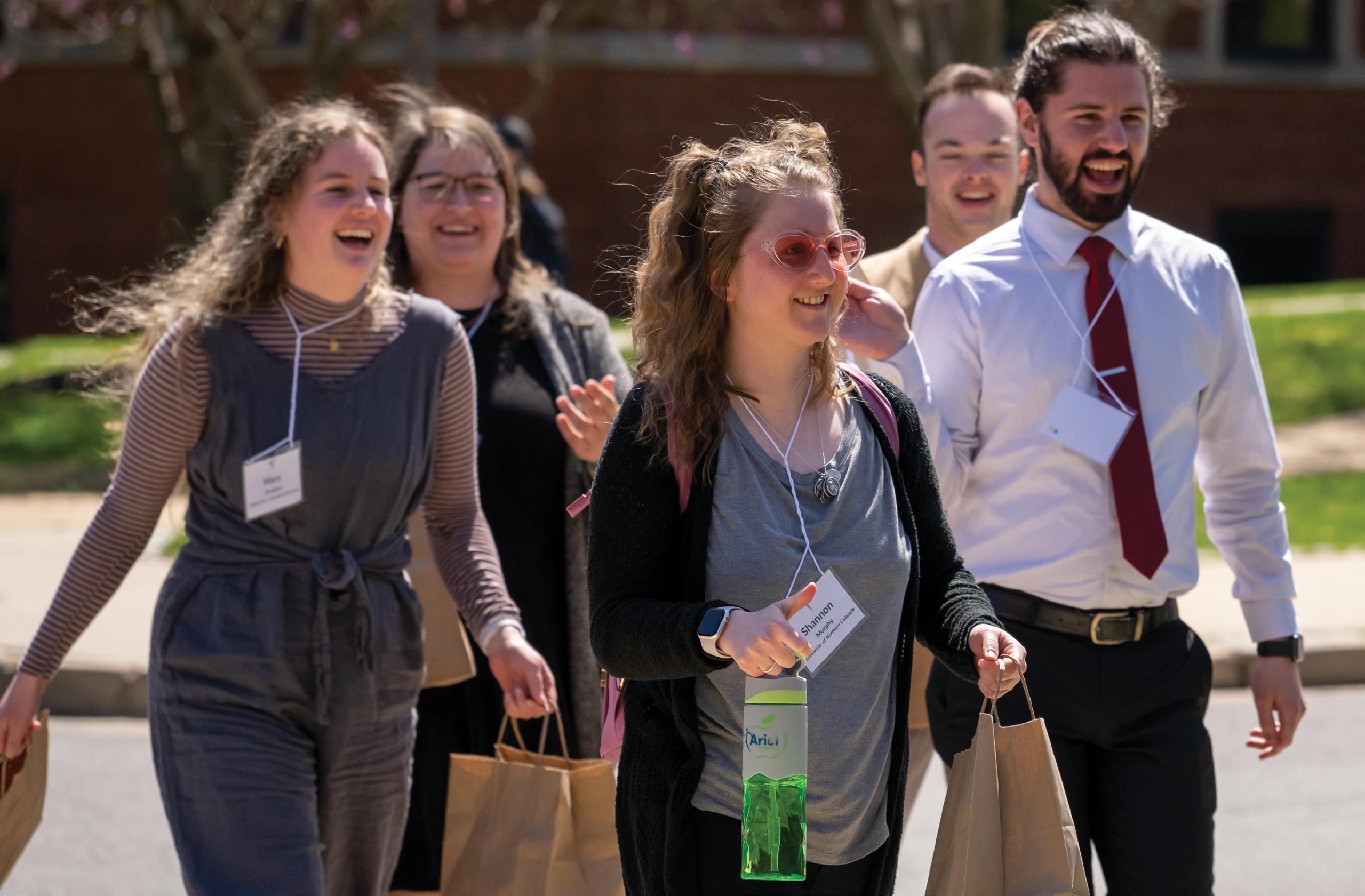
The idea of ESTEEM began in 2008 with a deep concern about the future of the Catholic Church following the exodus of many young adult Catholics, many of whom would go on to lead in various temporal spheres. What started as a series of conversations about the future of the Church is now the primary leadership formation program for young adult Catholics at over a dozen college and university campuses across the United States and the Caribbean.
ESTEEM is a joint partnership between Leadership Roundtable and Saint Thomas More Catholic Chapel and Center at Yale University that supports, encourages, and affirms the leadership of young adults in the Catholic Church and assists in their transition into parish life through education, community, faith formation, and mentorship.
Students attend the ESTEEM Capstone Conference in Washington, D.C.Leadership Roundtable is honored to present the J. Donald Monan, SJ Distinguished Catholic Philanthropy Medal. The Monan Medal seeks to inspire a culture of giving that promotes excellence in Church management and leadership. We look to recognize outstanding Catholic philanthropists who exemplify the legacy of the former president of Boston College, Fr. J. Donald Monan, SJ. Fr. Monan’s life was a living testimony to how best practices, implemented in collaboration between clergy and laity, can transform a Catholic institution to bring excellence to management and mission.
The J. Donald Monan, SJ Distinguished Catholic Philanthropy Medal recipients are Catholic philanthropists who have collaborated with Church leaders to make a significant impact on a parish, diocese, or other Catholic ministry in the area of Church management or leadership.


The Rooney Family — owners of the Pittsburgh Steelers — and Elaine and Ken Langone — co-founder of The Home Depot — were honored on Sept. 22 during the 2022 Catholic Partnership Summit for their generous giving to the Catholic Church and to Catholic charitable causes.
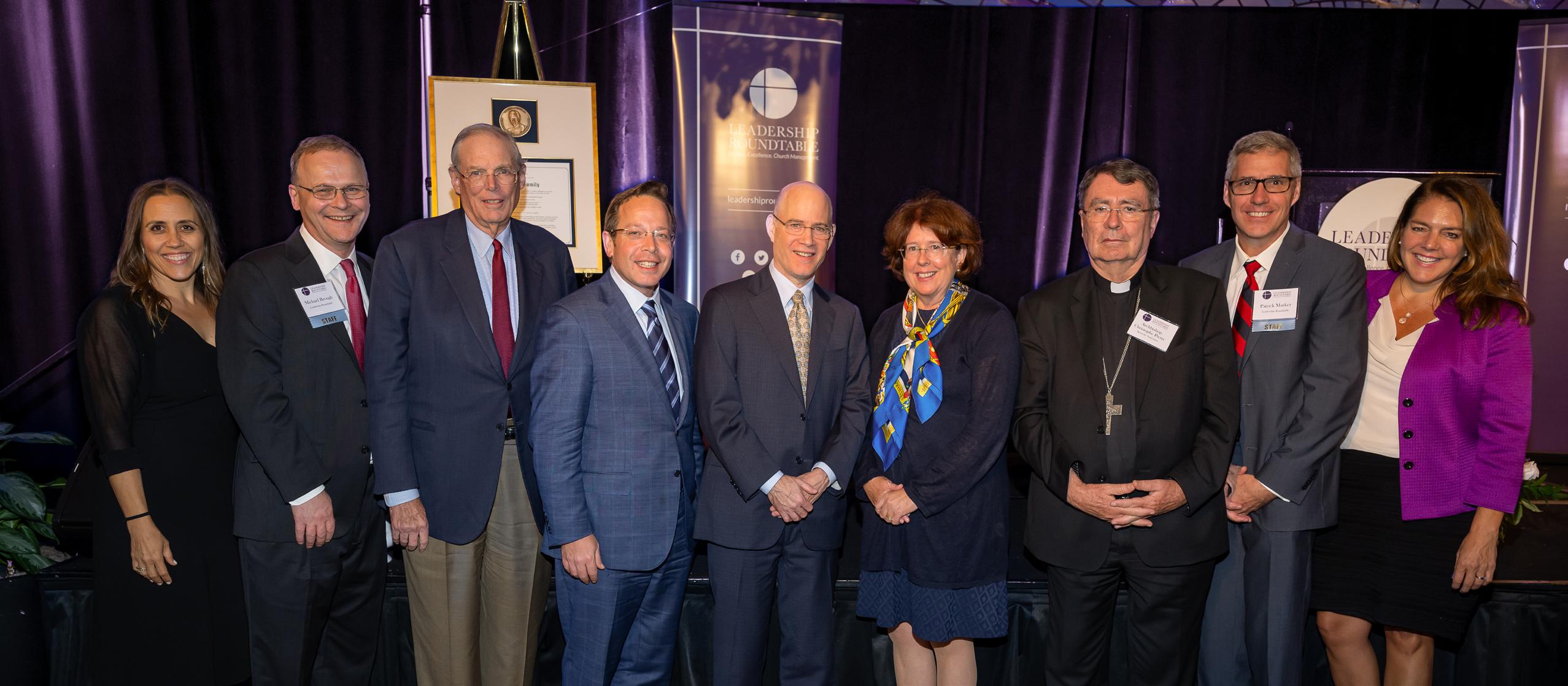
The Rooney Family and Mrs. and Mr. Langone received the J. Donald Monan, SJ Distinguished Catholic Philanthropy Medal (“Monan Medal”), an award conferred annually to Catholic philanthropists who have invested generously and faithfully in the work to promote excellence in Church management and leadership, and whose giving reflects Fr. Monan’s deeply held belief in collaborative excellence and partnership.
“The Rooneys and the Langones exemplify the strong commitment to faith and the generosity of both resources and spirit that was the hallmark of Fr. Monan’s life,” said Geoffrey T. Boisi, founder of Leadership Roundtable.
Established by Leadership Roundtable, the Monan Medal seeks to thank and inspire philanthropists of the Catholic faith who emulate and personify the vision, character, creativity, and commitment to excellence of the late Fr. Monan, a member of the Society of Jesus. Fr. Monan was the longest-serving president of Boston College and he dedicated his life to spreading Christ’s mission through
the inclusive partnership of ordained, religious, and lay Catholic leaders.
Both families received the Monan Medal at a special gala event on Sept. 22 in Washington, D.C., where the Apostolic Nuncio to the United States, Archbishop Christophe Pierre, offered a blessing. The families were nominated to receive the medal by a committee of Catholic leaders that included Fr. Monan’s cousin and trustee of Boston College Cynthia Lee Egan; Georgetown University President John “Jack” DeGioia; Association of Jesuit Colleges and Universities President Rev. Michael J. Garanzini, SJ; Former Harvard Professor Rev. J. Bryan Hehir; Children’s Scholarship Fund President Darla Romfo; and Rose Mary Donahue, assistant to the president at Boston College.
“I had the privilege of studying under Fr. Monan when I attended Boston College and to receive this honor, named in his legacy, in recognition of my family’s commitment to and support of our Catholic faith is humbling,” said Jim Rooney, who accepted the medal on behalf of his family.
“Faith, family, and football are strong values among my family, and none more important to us than our Catholic faith. It has been the catalyst for much of what we have been blessed to accomplish — from my father’s creation of the Rooney Rule to bring equity to leadership in
football, to our continued support of Catholic education and social services in Pittsburgh,” he said.
“When many of us in Pittsburgh think about the Rooney family, our minds go back to Art Rooney, Sr., fondly referred to as ‘The Chief,’ and his guidance of the Steelers football team,” said The Most Rev. David A. Zubik, bishop of the Diocese of Pittsburgh. “Through getting to know The Chief personally, I quickly became aware that, even with all his fame and financial success, his heart was always focused on his wife, his family, and the Catholic Church. Art Rooney, Sr. forged a path of servant leadership through his ongoing service to the Church and those in need. He invited the rest of his family to follow that same path.”
Art Rooney, Sr. founded the Steelers in 1933. His brother, a Benedictine monk known as Fr. Silas, served as Chaplain under Patton in World War II and taught renowned scholar Thomas Merton. For generations, the Rooney family has continued to support Catholic charities, institutions, and education.
Elaine and Ken Langone were among the original 40 signatories of The Giving Pledge, a promise by the world’s wealthiest individuals and families to dedicate the majority of their wealth to charitable causes. Elaine and Ken Langone signed the pledge noting in their commitment that “it is inspiring how such a simple idea puts faith into action for the community as a whole.”
Speaking about his generous support of St. Patrick’s Cathedral in New York City, Ken Langone said: “My activities here as a trustee of St. Patrick’s Cathedral, and my involvement in the restoration of St. Patrick’s Cathedral was a very precious part of my feeling that I was doing what I can to help people live a better, more spiritual life.”

In addition to their support of St. Patrick’s Cathedral, the Langones have also been long-time supporters of Catholic education, including Partnership Schools and the Inner City Schools Foundation,. Ken was made a Knight of St. Gregory by Pope Benedict XVI — an honor bestowed upon Catholic men and women in recognition of their personal service to the Holy See and to the Catholic Church, through their unusual labors, their support of the Holy See, and the examples they set in their communities and their countries.
“I think that those of us who have been blessed with experience in business have a very strong obligation to do what we can to help the spiritual leaders in our faith do as much as they can with whatever resources they’re given,” Ken said. “I really feel that is a strong moral obligation on all of our parts.”
Leadership Roundtable hosted the Monan Medal ceremony in conjunction with its Catholic Partnership Summit, a gathering of more than 230 leaders from across the U.S. on the theme of Living Synodal Leadership: Our Call to a Unified Church.
Patrick Markey
Managing Partner, Leadership Roundtable
Michael Brough
Executive Partner, Leadership Roundtable
Kim Smolik
Executive Partner, Leadership Roundtable
Kerry Robinson
Executive Partner, Leadership Roundtable
Archbishop Christophe Pierre
Apostolic Nuncio to the United States
Cardinal Joseph Tobin, CSsR Archbishop of Newark
Geoffrey Boisi
Founder, Leadership Roundtable
Elizabeth McCaul
Chair, Leadership Roundtable Board of Directors
Susan King
Board Member, Leadership Roundtable Board of Directors
David Gibson
Director, Fordham University Center on Religion and Culture
Cardinal Mario Grech
Secretary General, Vatican Synod of Bishops
Cardinal Wilton Gregory
Archbishop, Archdiocese of Washington
Patrick Schmadeke
Director of Evangelization, Diocese of Davenport
Rev. John Hurley, CSP
Founder, New Evangelization Strategies
Shannen Williams
Associate Professor of History, University of Dayton
The Most Rev. John Stowe, OFM Conv.
Bishop, Diocese of Lexington
Robert C. “Bob” Bordone
Senior Fellow, Harvard Law School; Founder and Principal, The Cambridge Negotiation Institute
Amy Uelmen
Lecturer & Special Advisor to the Dean, Georgetown Law School; Senior Research Fellow, Berkley Center on Religion, Peace and World Affairs
Carolyn Woo
Author, “Rising: Learning from Women’s Leadership in Catholic Ministries”; CEO (retired), Catholic Relief Services; Former Dean, University of Notre Dame’s Mendoza College of Business
Sr. Teresa Maya, CCVI Sisters of Charity of the Incarnate Word
Kathleen McChesney
Chief Executive Officer, Kinsale Consulting; Author, “Sexual Abuse in the Catholic Church: A Decade of Crisis”
Casey Stanton Co-Director, Discerning Deacons
Alexandra Carroll
Communications Manager for Social Mission, Department of Justice, Peace and Human Development, USCCB
Krisanne Vaillancourt Murphy
Executive Director, Catholic Mobilizing Network
Vicente Del Real
Founder and Executive Director, Iskali
John Cannon
Founder, SENT Ventures
Bruno Spriet
Global Programme Manager, Porticus (former)
British Robinson
President and CEO, Barbara Bush Foundation for Family Literacy

Geoffrey T. Boisi
Joseph Regan
Dan and Kathleen Denihan
Elizabeth McCaul and Frank Ingrassia
The Bisignano Family
Dee and Kevin Conway
Kevin Fee
Mario J. Gabelli
Bryan and Stephanie Grane
Healey Family Foundation
Elaine and Ken Langone
The Leon and Toby Cooperman Family Foundation
The Lynch Foundation
Peggy and Gene McQuade
The Paul and Sandra Montrone Family
Dominic A. Tarantino
Anonymous
Carney Family Charitable Foundation
Kevin K. Carton
Catholic Health Association
The Catholic University of America
Bob and Peggy Gartland
The Markey Family
Robert H. Niehaus
The Raskob Foundation for Catholic Activities
CAPTRUST Advisors
Catholic Extension
CCS Fundraising
Changing Our World, Inc.
Dr. Geno M. Fernandez
Gallagher | Global Religious Practice

Loyola University Chicago
ParishSOFT
The Pontifical Mission Societies in the U.S.
Brenda and Bob Popeo
Sacred Heart Seminary and School of Theology
Seton Hall University
Archdiocese of Louisville
Association of U.S. Catholic Priests
Rev. John P. Beal, JCD
Stephanie and Michael Brough
Burnett Risk Control International
Catholic Women Preach
Rob Crisci
The Cron Family Foundation
Barbara Anne Cusack, JCD
The Hank Center for the Catholic Intellectual Heritage
John and Maureen Hurley
Susan and Mike King
Kinsale Consulting
The Honorable Michael Montelongo
Angela and Edward Murphy
Tom Nowak
Kerry Robinson and Michael Cappello
John A. Werwaiss
In partnership with lay, ordained, and religious leaders and organizations across all sectors of the Catholic community in the United States and Rome, Leadership Roundtable seeks to elevate and implement best practices in management and leadership to establish a culture of co-responsible, servant leadership for a healthy, thriving Church in the U.S.
info@leadershiproundtable.org
leadershiproundtable.org
© 2023 Leadership Roundtable. All rights reserved.